#In Which Our Protagonists are Introduced
Text
So I've seen a few too many people on twitter talking about The Kiss Scene from the new Scott Pilgrim anime. People saying it's fetishistic and indulgent, people calling it male gazey, etc. And while the kiss itself is certainly a bit exaggerated, I felt like writing a bit about why I disagree, and why context is important, like it always is. But it basically turned into an extended analysis on the metatextual treatment of Roxie Richter. So bear with me. It's a long post.
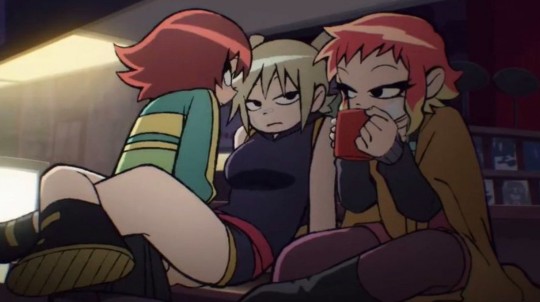
What really matters about this scene is not the kiss itself, but what precedes it. Not even just the fight scene just before it, but what precedes the whole anime series, really. And that's the Scott Pilgrim comic book, and the live action movie. Because in both, Roxie is a punchline.
She's a joke. Her character starts and ends with "one of the exes is actually a girl, I bet you didn't expect that." Jokes are made about Ramona's latent bisexuality, the movie especially treating it as funny and absurd, and her validity as a romantic interest is entirely written off by Ramona as being "just a phase." There's a fight scene, she's defeated by a man giving her an orgasm which implicitly calls her sexuality into question (come on), and the movie just moves on. It sucks. It really, really sucks.
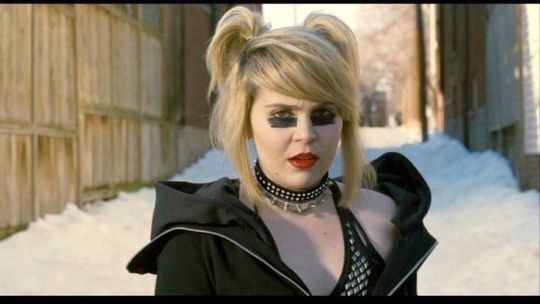
The comic fares a little better. It never veers into outright homophobia like the movie does, and while the line about Ramona having gone through a phase remains, Roxie actually gets one over on Scott when Ramona briefly gets back with Roxie. But Roxie is still only barely a character. Like all the other evil exes, she's just a stepping stone towards the male protagonist's development. She barely even gets any screentime before she's defeated by Scott's "power of love." But Roxie stands out, since she's the only villain who is queer, or at least had been confirmed queer at that point (hi Todd). In a series that champions multiple gay men in the supporting cast, the single undeniable lesbian in the story is a villain. She's labeled as evil, made fun of, pushed aside in favor of the men, and then discarded. Her screentime was never about her, or her feelings for Ramona. It was about the straight, male protagonist needing to overcome her. And that was Roxie Richter. An unfortunate victim of the 2010s.
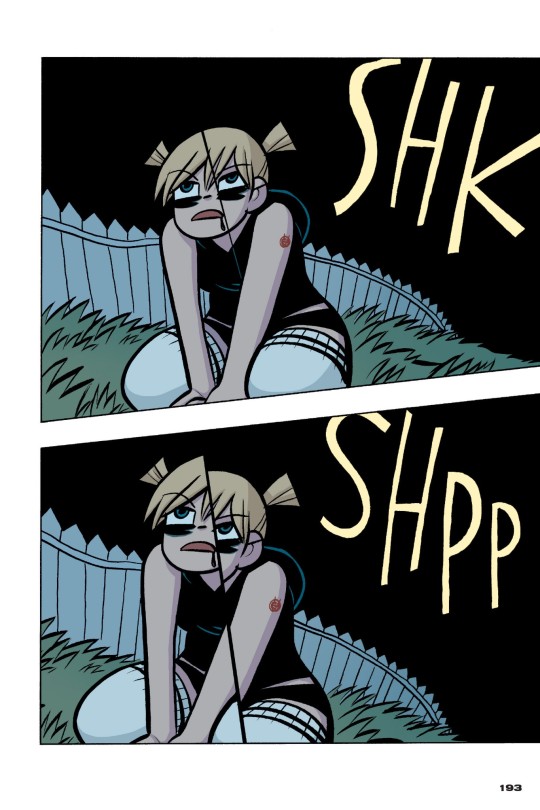
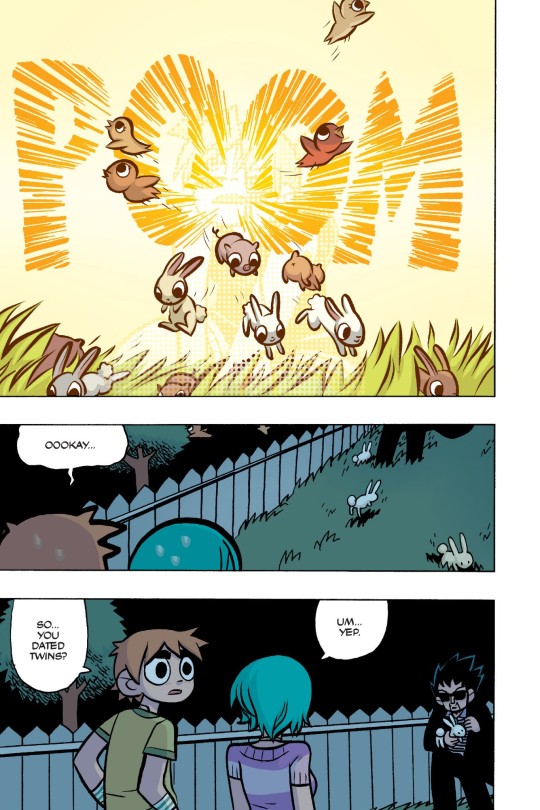
Fast forward to current year, and the new anime series is announced. Everybody sits down to watch the new series expecting another retelling of the same story, and.... hang on, that straight male protagonist I mentioned just died in the first episode. And now it's humanizing the villains from the original story. And there's Roxie, introduced alongside the other evil exes in the second episode, and she's being played entirely straight, without a punchline in sight. No jokes are made about her gender, no questions are made of her validity as one of Ramona's romantic interests. The narrative considers her important. In one episode, she already gets more respect than she did in either of the previous iterations of Scott Pilgrim. And this isn't even her focus episode yet... which happens to be the very next one.
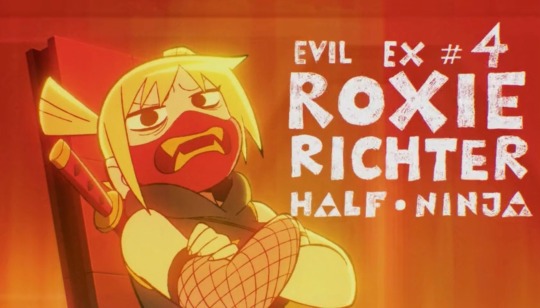
The anime series goes to great lengths to flesh out the original story's villains and to have Ramona reconcile with them. And I don't think it's a coincidence that Roxie gets to go first. While Matthew Patel gets his development in episode 2, Roxie is the first to directly confront Ramona, now our main protagonist. This is notable too because it's the only time the exes are encountered out of order. Roxie is supposed to be number 4, but she's first in line, and later on you realize that she's the only one who's out of sequence. She's the one who sets the precedent for the villains being redeemed. She's the most important character for Ramona to reconcile with.
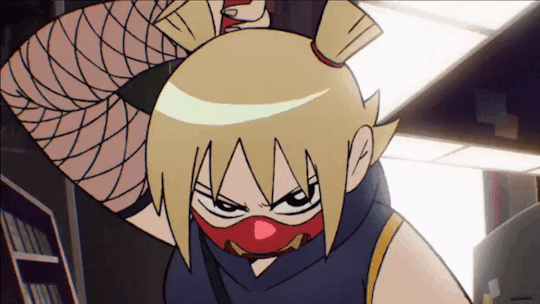
What follows is probably the most extensive, elaborate 1 on 1 fight scene in the whole show. Roxie fights like a wounded animal, her motions are desperate and pained. Ramona can only barely fight back against her onslaught. Different set-pieces fly by at breakneck speed as Roxie relentlessly lays her feelings at Ramona's feet through her attacks and her distraught shouts. And unlike the comic or the movie, Ramona acknowledges them, and sincerely apologizes. And the two end up just laying there, exhausted, reminiscing about when they were together.
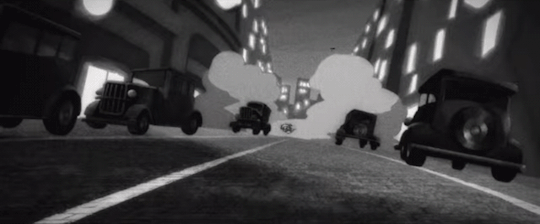
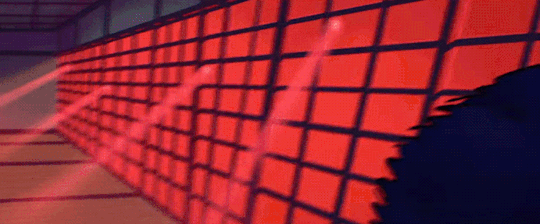

Only after this, after all of this, does the kiss scene happen. Roxie has been vindicated, she has reconciled with the person who hurt her, the narrative has deemed that her anger is justified and has redeemed her character. And she gets her victory lap by making the nearest other hot girl question her heterosexuality, sharing a sloppy kiss with her as the music triumphantly crescendos.
It's... a little self-congratulatory, honestly. But it's good. It's redemption for a character who had been mistreated for over a decade. And she punctuates the moment by being very, very gay where everyone can see it, no men anywhere in sight. Because this is her moment. And then she leaves the plot, on her own accord this time, while humming the hampster dance. What a legend. How could anything be wrong with this.
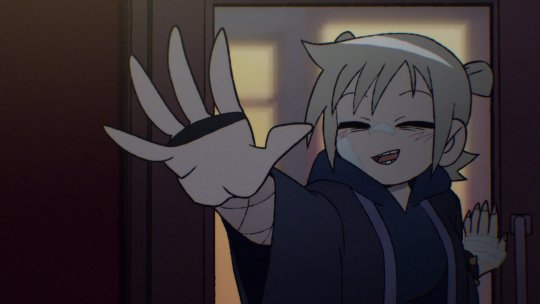
#scott pilgrim#spto#scott pilgrim takes off#roxie richter#roxanne richter#scott pilgrim spoilers#spto spoilers
19K notes
·
View notes
Text
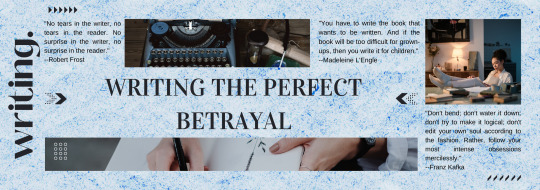
The classic betrayer
This is where everyone subtly knows that this guy's going to turn the other way.
The betrayer puts on a show for our heroes - kind, compassionate and supporting at first.
it just so happens that the villainthinks the heros are the bad guys.
make them actually likable.emotionally ruin the hero upon betrayal.
The remorseful traitor
whether he had bad intentions from the start or was deceived by
others, the betrayer regrets his choices.
when he realizes his mistakes, it's too late to stop the evil, which
introduces guilt.
throw the guilt and shame on the character.
even the protagonist can be a traitor! will others forgive him?
The Double Agent
this type of traitor will keep the readers wondering whether this guy is truly on your side.
keep your readers guessing. is that an evil smirk or a genuine smile? does he really love drinking, or is he just trying to get the hero drugged?
Snape in Harry Potter is a great example.
The guy can be good or bad - just keep balancing the two
Unrealiable narrators
these characters are not entirely betrayers, but horribly
misinformed. they can make others appear like traitors - when in truth, they just have it wrong.
pit your narrow-minded narrator against his allies.
these characters are great for misunderstanding plots.
have your narrator do irreversible damage to the hero. would they
forgive him?
Tragic betrayers
these are characters, due to their past wounds and trauma, cannot
help but betray the group.
they confess the hero's secrets under physical/mental torment and
doesn't have the backbone to do otherwise.
these characters can either be pitiful or frustrating would the hero still fight for the betrayer?
Play around with pov
you can have the readers know about the upcomong betrayal by
switching points of view, building up anticipation to the moment of
realization.
on the flip side, you can change povs in a way that the reader
doens't see what's happening at the hero's back.
If you like my blog, buy me a coffee☕ and find me on instagram! 📸
#writer#writers#creative writing#writing#writing community#writers of tumblr#creative writers#writing inspiration#writeblr#writing tips#writers corner#writers community#poets and writers#writing advice#writing resources#writers on tumblr#writers and poets#helping writers#writing help#writing tips and tricks#how to write#writing life#let's write#resources for writers#references for writers
2K notes
·
View notes
Text
A conversation between Moto Hagio, Hideaki Anno, and Shimako Sato
In our first ever translation work we share a riveting conversation between Moto Hagio, Hideaki Anno, and Shimako Sato! Read on our wordpress or keep reading on tumblr under the readmore
For the 189th issue of the Magazine House publication Hato yo! published January 1st 2000, movie director and screenwriter Shimako Sato leads a three way conversation between herself and her acquaintances, the anime and live action movie director Hideaki Anno, and manga artist Moto Hagio.
Together they discuss their respective admiration for each other’s work, Anno’s past statements on otaku, their takes on parent-child relations, how to escape puberty, and why Anno finds it scary to be around children.
To Me, There is 5 Ways To End a Story
Hagio: I got really into Neon Genesis Evangelion after it finished airing (laughter). I had been told by an acquaintance that Eva was a work that had “fans who were looking forward to watching the series so enraged by the developments in the final episode that they broke their TVs” (laughter). I wondered what could a work that evokes such strong emotions be like? I was really interested, so I borrowed the VHS tapes from a friend of Shimako-san’s, then I started watching.
Anno: I’m a big fan of Hagio-san’s manga, so when Shimako-san first said she could introduce us and arrange this meeting I was truly happy. The fact that you took an interest in Eva is an honor but… When I first heard “to me, there are five ways to end a story” I thought “as expected; amazing!” So after several twists and turns I finally reached a conclusion
Sato: Anno-san, when did you first encounter Hagio-san’s work?
Anno: The first one I read was They Were 11! during its serialization. In elementary school I read it at the Ear-Nose-Throat Doctor. I generally read manga at the waiting room there or at the barbers, since I didn’t really get any manga to read at home. When I read They Were 11! back then I was blown away. After that I read Hyaku Oku no Hiru to Senoku no Yoru [trans: Ten Billion Days and One Hundred Billion Nights, original story by Ryu Mitsuse]. My favorite work is Half-god [Hanshin]. The fact that such a meaningful story could be told in only 16 pages is amazing. I think Hagio-san is a genius storyteller, but her art is amazing as well. In middle school I thought that if I copied Hagio-san’s art I’d become better at drawing.
Sato: If you had also imitated her storytelling would that perhaps have changed Eva’s final episode? (laughter)

Saving the world, love and hatred
Anno: You know, I don’t have much interest in concluding a story.
Sato: Do you hate wrapping a furoshiki? [trans note: a traditional wrapping cloth]
Anno: No, it’s that I think you can do more with a furoshiki than tie it up pretty. Like break it or tear it to shreds, all kinds of things.
Sato: If we include all that, isn’t that still doing the act of wrapping?
Hagio: In your case Anno-san, I find your way of grasping the world unique.
Sato: For both Anno-san and Hagio-san, even with the differences between manga and anime you’re making a serialized work, right. When you make a long-form work, is the ending something that is already decided? Or is it something that changes?
Anno: For me it’s something like a live performance, and ends up gradually changing as I create the work.
Hagio: I’m a bit too careful, so I can’t draw if I haven’t thought of the ending. An exception is when I made Star Red. Otherworld Barbara which I made later also ended up becoming an exception
Anno: Star Red’s ending was magnificent. I was also influenced by Star Red. Actually, I’ve written some dialogue similar to the one in Star Red’s ending
Sato: Which of the characters do you like?
Anno: Well, the protagonist.
Sato: I like Elg. At first I thought he was a rather unreliable person, but he gradually came to play an active role. By the end he revived a dead planet through love.
Hagio: I also like characters like that!
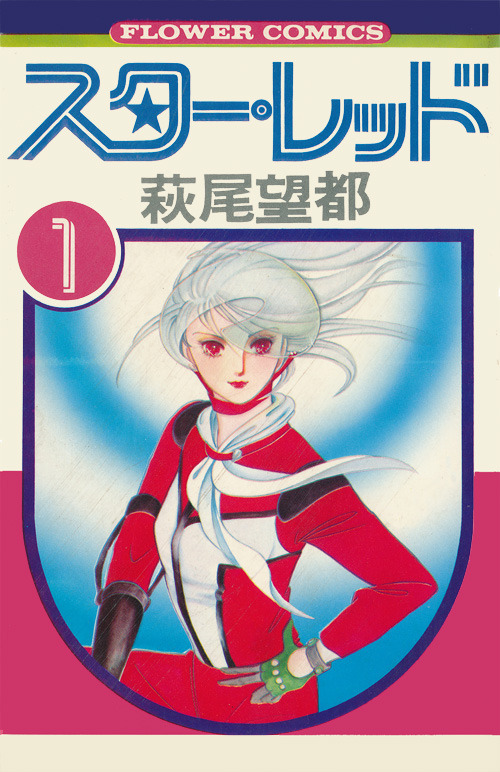
Sato: When I watch Anno’s works like Eva I feel like you are more the kind of person who saves the world through hatred, what do you think?
Anno: I don’t know
Hagio: That feeling of uncertainty becomes the foundation of your storytelling doesn’t it? I come to think that that feeling is something so overflowing you can’t tie it all together.
Sato: It seems you have some differences when it comes to making a story, but I think one thing your stories have in common is perhaps parent-child relations?
Anno: That is true, Hagio-san. Your relationship with your mother appears in your work…
Hagio: When I was a child, my older sister was my mother’s favorite, I was always compared to her. It seemed my mother thought that compared to my sister I was unreliable so she always worried about me, even when I was into my thirties she’d tell me to quit making manga.
Sato: And that was during The Poe Clan’s heyday wasn’t it?
Hagio: (laughter) When I was watching Eva, something that really caught my attention was Shinji-kun worrying about whether or not he was useful to his father. Yet there was a distance from his father. During that time I was very interested in, to put it into words, “broken relations.”
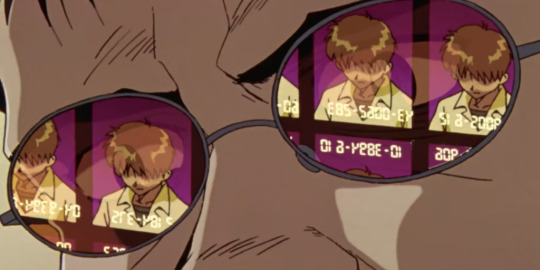
Otaku Are Generally Uncool
Sato: Anno-san, in your work I think father-son relations is something that makes an appearance. Are there any real experiences behind that?
Anno: My family was normal. If I have a complex it would be that we were a poor family rather than a just normal one, and my father has only one leg. Regardless, I think stories about parents are the simplest to make, it’s easy.
Sato: So since Eva is a parent-child story it ended up like that?
Anno: What makes it easy is that we have some preconceived assumptions about [parent-child relations], “have you argued with your parents?” and such.
Sato: What appears in your work isn’t those things, but your own internalized problems don’t you think.
Anno: That appears to be it. As for my family we truly were the archetypical lower middle class household. My father was a good person. A sensible man. When you’re under circumstances like my father was you have to live sensibly or else you’re excluded.
Sato: So in opposition to that, you became an otaku.
Anno: That might be it. Your most important model for what normalcy is is your family. But I have a younger sister and she is exceedingly normal. She doesn’t read manga, there is nothing twisted about her at all.
Sato: And by twisted you mean?
Anno: That she’s not an otaku.
Sato: Anno-san, you’ve said that you hate otaku, haven’t you.
Anno: It’s not hate. It’s just that I think otaku are uncool. To otherwise not notice that you’re uncool or purposefully suppressing that fact makes me feel disgusted.
Sato: What about The Matrix? Isn’t that a cool otaku movie?
Anno: That one is also uncool.
Hagio: Even though Keanu Reeves is cool.
Anno: Keanu is cool. Because he is not an otaku. The otaku are the Wachowskis. They can’t get out of the confinements of their otaku-ism. So for example, even if they make something cool, part of it will for certain be otaku-like Even though I say this I don’t hate it. If I truly did I’d quit being an otaku.
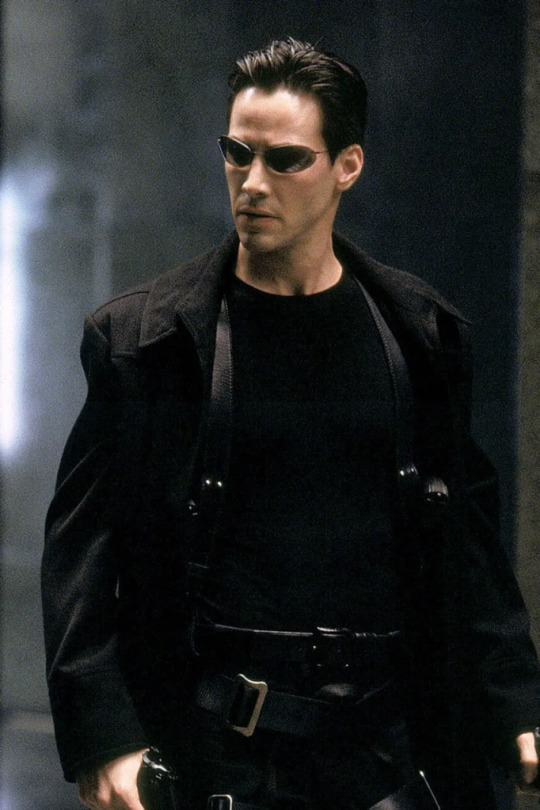
Sato: Hagio-san, would you say your family was normal or was it perhaps affluent?
Joh (Hagio’s manager): Hagio-san and her mother actually have a similar biorhythm. It was perhaps due to that fact that Hagio rebelled by pursuing the path of becoming a manga artist.
Hagio: I might have been running away by drawing. But, if I had rebelled by becoming a delinquent I think it perhaps might’ve been more enriching to me as a person.
Anno: To become a creator is not something I think is a happy path to go down. In order to not be unhappy you have to work for dear life. At the very least create works as if you’re going back to zero [from the negatives].
Hagio: Is it a negative? Because you are an otaku?
Anno: Being an otaku is a huge negative. You make up for it either by relying on others or by producing creative works. With that said, I think my generation has it easier than yours, Hagio-san. This is an era where even old men read manga. My parents even now have no issues with my line of work. I appear in Asahi Shimbun, I appear on NHK, they have nothing to worry about. That is also why I will try not to ever refuse any coverage from my hometown newspapers.
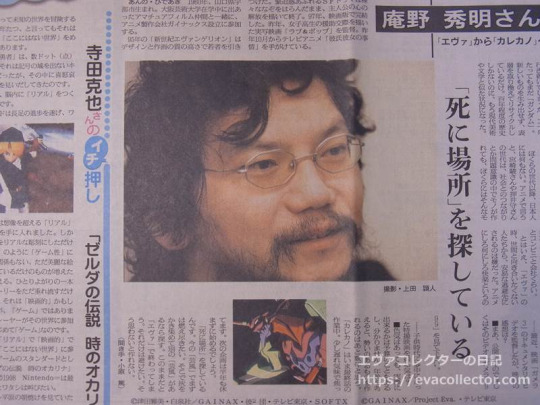
Hagio: But don’t you think parents don’t truly understand? Even if I become famous, my parents will say; can’t you quit drawing manga? And just appear in the newspaper? (laughter)
Sato: But if you quit drawing manga you won’t appear in the newspaper. (laughter)
Hagio: In that context, a part of me still expects too much affirmation from my parents. Not externally but internally. Even if I appear in Asahi Shimbun I still end up thinking it’s not good enough.
Sato: The fact that you still worry so much about what your parents think at your age Hagio-san, it’s so strange.
Hagio: Yes, I think so too
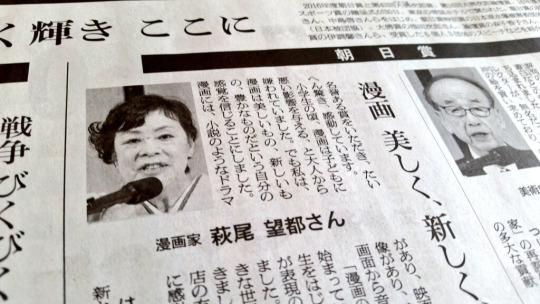
Anno: Could it be that you have to become a parent to change that part of you that worries so much about what your parents think?
Sato: I don’t worry at all about what my parents think.
Anno: I also don’t care even a little bit. As far as I’m concerned, I’m bored if I get my parents’ approval. When I did Nadia: The Secret Of Blue Water for NHK I felt that feeling.
Sato: Do you have a replacement parent figure?
Anno: Well, a man without imaginary enemies is no good. For me right now, I think I want to make works that have Hayao Miyazaki beat.
Sato: Hagio-san, your worries might also be what gives birth to your works.
Hagio: That might be the case.
Sato: Anno-san, earlier, you said “you have to become a parent to change.” I personally don’t think if you don’t have children you can’t become an adult. I think that being an adult is being independent in everything you do. That’s why I think marriage or having children doesn’t change anything.
Anno: You can become a parent without being an adult. At 17 or 18 you could become a parent. To become a parent without even being an adult, that is the problem I think.
Sato: Do you consider yourself to be an adult, Anno-san?
Anno: I guess I’m a child.
Sato: I don’t consider my parents to be adults.
Hagio: I’m very discontent with the fact that my parents aren’t adults.
Anno: I’m not discontent.
Sato: For me realizing that my parents aren’t absolute adults was a relief during my middle school years. Until then I had played the role of an exemplary student, but when I realized that fact I stopped playing that role.
Hagio: So you’re a child who didn’t fit into your parents’ expectations. I was also a child who didn’t fit into my parents’ expectations, but the fact that they didn’t shrug their shoulders and say “that’s fine,” filled me with anxiety. I thought that if I become an adult I’d lose that anxiety. But I want recognition from people. I continue to request affirmation.
Sato: Anno-san, in Eva you portrayed children like this, but are you like this yourself?
Anno: The affirmation? Hmmm. That kind of thing changes with the project.
Hagio & Sato: ?
Anno: I don’t believe in the supremacy of the director of a work, but rather the work itself. What would be best for the work, I only base my judgment on the total. Although I won’t hand over the executive decisions.
Hagio: Manga is a one-man job, but with a movie there’s the director, the scriptwriter, the actors, etc. Each of them sees themselves as a leading part. Furthermore as living beings the things we do will sometimes diverge from the plan we made in our heads. The fun of living is discovering what those differences will be.
Is Eva The Rite of Passage That Will Get Us Through Puberty?
Sato: The movie Love & Pop that you directed Anno-san, the original creator Ryuu Murakami-san and yourself are both men, yet the story is about high school girls. I found that interesting.
Hagio: I thought that both of you wanted to be very similar to an archetypal girl. You said you wanted to see a part of puberty, and girlhood that you couldn’t control. After all, men aren’t just made up of boys. I believe that femininity and masculinity is something we have combined within us. Sort of androgynous.

Sato: The boys you create not having that vivid true-to-life quality to them I think is a representation of that. Anno-san, as a man, what do you think of the boys in Hagio-san’s manga?
Anno: I think they have empathy. I think what I like the most is that all the characters are smart. Because they have such a high intelligence it feels good to read.
Hagio: Like a washing machine right at the peak of its cycle, I want to leave my characters on the verge of that kind of critical point [of merger]. To be honest, the idea that once you’re past 30 you’ve become an old lady, that sense is something we’ve left behind.
Sato: I’ve found that when men become old they lose their ability to be nihilistic in their work, is it the same as that?
Anno: In the case of men, as you age, the world view [of your fiction] rather than your characters come to reflect your nihilism. You don’t aspire to be nihilistic, you yourself are becoming nihilistic. Your world view is what gradually utilizes nihilism. Isao Takahata, for example, is a nihilistic person. Nothing is born from being nihilistic. As nihilism is Plus-Minus-Zero, eventually your heart can’t be moved.
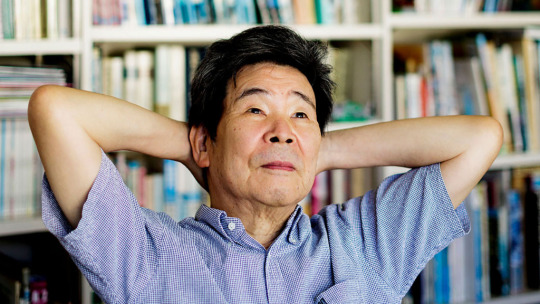
Hagio: A world that doesn’t change, isn’t that comfortable?
Sato: Even though in order to grow you have to fight. By asking like this, Anno-san, did you not experience puberty?
Anno: That might be it.
Hagio: I thought you were right in the middle of puberty.
Anno: I thought I’m losing it, but it might be puberty. Generally speaking, otaku don’t go through puberty.
Hagio: I thought otaku went through a prolonged chronic puberty.
Anno: It’s not what society ordinarily calls puberty.
Hagio: A never ending puberty, in this age, could it perhaps be because there are no more rites of passage?
Anno: Sure enough, you have to bungee jump. (laughter)
Hagio: A ritual to let your childhood die and then replay it, such a thing doesn’t exist now. Taking entrance exams may be the closest to [a rite of passage].
Sato: Don’t you feel like lately that age around 30 is when the coming of age ceremony actually happens?
Hagio: For that part, that’s when the stories takes on that role I think.
Sato: As a ritual?
Hagio: It’s not a ritual, but perhaps more intuitive? A trial run on a mock life. By that definition, I noticed Eva is just like that. I had an acquaintance who is a teacher from the Kyoto Steiner school. They saw the Eva movie in theaters. At that time they found the reactions of the people watching to be more interesting than the story. They had thought, isn’t it like we’ve all come to see the rite of passage which we all failed? I thought so as well “that’s right, that is interesting.” The rite of passage to become an adult after entering puberty, be it Gundam or Eva those stories put people in a position where they are observing the world, observing themselves, experiencing war and such.
Sato: Anno-san, were you considering all this…
Anno: I didn’t make it like that. But when I was making the movie I was thinking of this a little.
Hagio: When I watched Eva it ended up overlapping with the book Childhood [by Jan Myrdal]. It’s a book about a mother who can’t love her child. She thinks “I have to take care of this child”, but even so she can’t love him. I wonder what happens to children raised like this. Children learn from their parents. In truth there will be consequences for the parent, but the question on my mind was children who can’t find their place with the parent, where can they find their place instead? Although I thought you were such a person when you were making Eva, Anno-san. (laughter)
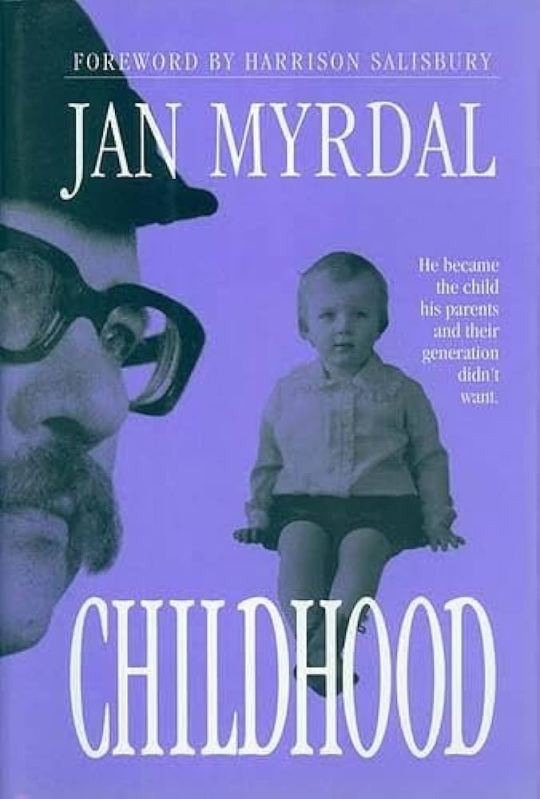
Sato: Speaking of, the other day you were on a TV show teaching grade schoolers about anime, Anno-san. What do you think of children?
Anno: I was scared of being in contact with children. I don’t understand the appropriate distance to take. I believe even the most casual thing an adult says mustn’t traumatize them, I end up becoming oversensitive. In grade school during still drawing class, I’d draw roof tiles and other detailed things, but humans moved around and I found it annoying, so I never drew people. Because of that my teacher said “this isn’t a child’s drawing,” which deeply hurt me. In the end, from that experience I think it was a part of the reason why I decided on working with drawing. Even though I opposed standardized education, I really felt the difficulty of dealing with not having a basic manual.
By the way, how much longer until Zankoku na Kami ga Shihai Suru [trans: A Cruel God Reigns] ends? I made a mistake. I wanted to read it all at once, right, so I refrained from buying it but… when volume 6 came out I ended up buying all of them.
Hagio: Oh yes, right. July next year I think.
Anno: Understood. Then the final collected volume will be out in the fall of next year. Hmm well that means I can enjoy it for another year. Understood.
Sato: Isn’t that great.
------------------------------
Translated by mod Juli, with assistance from two financially compensated native speakers.
A scan of the full interview raws has now been added to the wordpress version!
268 notes
·
View notes
Text
Shangri-La Frontier mid-season review
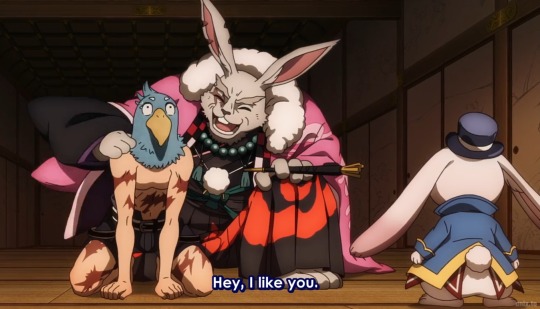
This is by far the best fake video game I've ever seen written in fiction.
Most MMO-centric isekai stories have trouble with providing accurate and realistic depictions of the complexities and minutia that give MMOs the allure they have. I've seen so much handwavey bullshit tacked onto fake-games that introduce unrealistically overlooked mechanics for reasons like giving the protag immense power just because they're the protag and the story is about them. A good example of this is another MMO Isekai airing this season, "A Playthrough of a Certain Dude's VRMMO Life", wherein the main character becomes extremely rich, powerful, and famous by episode 2 because he stumbled into a stealth archer playstyle, a build which apparently no human in that universe had ever conceived of before, and then making a fortune by selling basic potions to everyone after NPCs stopped selling them (another thing he was uniquely able to do because not a single other player had the forethought to spec into alchemy). These lesser, dime-a-dozen isekai add up to be boring fantasy strories with gaming elements clumsily put in so that the author can demonstrate how powerful the world's inhabitants are by showing their stat allocation screen instead of, say, explaining anything about what they do that's so uniquely powerful and how they figured it out. Ya know, stuff you'd hope to hear about from any competent story.
Shangri-La Frontier is a breath of fresh air for anyone who, like me, is sick of authors ignoring the things that actually make video games compelling in service of creating a stock-standard narratives in fantasy worlds because it allows them to get away with bullshit. I've always found it very convenient that many isekai narratives indulge in things like chattel slavery, because it's societally normal enough for the protag to purchase a beautiful, vulnerable girl to add to his harem (dont worry, she is always inexplicably in love with him no matter what because he's SUCH a kind master). And it never really seems to go anywhere. Because the Video Game Isekai, while an interesting premise in theory, is more often than not used exclusively as a means to simplify the structure of a world's power scaling to abide by an arbitrary set of omnipresent universal rules (e.g. what people who have never cared to look into game development think of video games). This anime, by comparison, is VERY clearly authored by someone who plays a LOT of games.
Every piece of logic used to drive the plot forward, so far, is congruent to a real-world example of video game conventions, and I'm not just talking about levelling up and selling monster parts. Story elements that I've rarely (if ever) seen explored in other isekai are ever-present and genuinely clever and amusingly introduced. My favorite example of this so far has been the way the protagonist has been able to go head to head with so many overlevelled foes in the first 9 episodes. The story of course makes note of how good of a gamer Sanraku (our hero) is, but much like in real life games, being super duper good at dodging attacks doesn't really make up for a 70 level gap in items and learned skills. For that reason, he gets his ass whooped more often than he actually outsmarts others (so far he hasn't beaten a single player in pvp). So how is he getting out of these situations without dying so frequently? Simple: he got access to a later area too early relative to his level (sequence break) and got access to a high level follower NPC that's been carrying him. This is something he acknowledges directly several times, specifically using words like "Emul has been hard-carrying me for a while." This, to me, is extraordinarily meaningful. That's something you can exploit in Skyrim, man. That's REALISTIC CHEESE STRATS. The excitement and wonder I find in this show doesn't come from watching the protag do something unexpected, but by watching him do something that I would think to do.
This knowledge the author has demonstrated regarding modern gaming culture extends further into the actual realistic nature of game design and community. The story exists in a reality where full-dive VRMMOs are the be-all-end-all of gaming, and given the prohibitively expensive nature of developing and designing expansive, immersive worlds, most games are pretty shit. It's been hinted at so far that this is due to a monopolistic megacorp which is one of the only entities rich and powerful enough to make a good game (the game in question being the one that shares the title of the anime), but so far the strife of the characters have been pretty centralized to the happenings of the game world and its politics. By the way, lets talk about the game world's player base politics, which I'm also quite pleased with. It exists in the form of guilds and clans who struggle for power not by participating in seemingly random pvp with other powerful players to see who is the most epic and badass warrior (again, like many contemporary isekai typically opt for), but by gaining actual realistic support from a fictional playerbase with realistic desires and playstyles. Some guilds are interested in lore, some gather for alliance and boss raids, some for things like animal husbandry, and (naturally) at least one is dedicated to trolling and PKing. Each of these factions, through the very little that we've seen of them so far, communicate on forums and only know as much as is reasonable for them to know. The only reason they give a shit about the protagonist at all is because he gained access to a high-level unique scenario quest that they want information on how to access, and the only reason word of that got out in the first place was because someone posted a screenshot of him with a unique NPC onto a forum, asking about it as "where can i find this pet summon, its super cute!" That's real. That's video games, baby.
I like this show a lot so far. I like that it cares about video games, but I also like its writing. I like the main character and how hes less of an ultra badass super cool guy, and more of an earnest challenge-run lets player. Like, a lot of his dialogue straight up sounds strikingly similar to Japanese youtubers. And he's naturally always quick to point out inconsistencies in the game world's logic. I ALSO really like his community of pals from a janky old fighting game, and I ADORE the girl from his school who has a crush on him and also just so happens to be an exceptionally high level player from a top clan, and how she had to spend 9 episodes working up the courage to send him a friend request. I love that so, so much, dude.
I highly recommend this show if you're into a single thing I've mentioned. The animation is great. The world is beautiful. The character design is immaculate. And I'm looking forward to watching it continue.
637 notes
·
View notes
Text
No but I gotta talk about Medusa for a minute actually.
It's been. A very long time since I read the PJO books so I don't exactly remember how Uncle Rick presents Medusa in the book. But the way the show introduces her myth? Fascinating. For me as a Greek mythology enthusiast, that is.
The show makes Medusa a victim of Athena. Of course, the show is mainly for kids, so they can't exactly say that, hey, kids, Medusa was Athena's priestess and she was raped by Poseidon, YEP, or protagonist's father, IN Athena's temple, nah, that's neither kid-friendly nor does it endears us to Poseidon. Not that Poseidon is very dear to us viewers/readers at this point, our narrator/protagonist can't stand his own dad.
But still what fascinates me is that even though they twisted the myth to ft the narrative they still managed to evoke Athena's curse as being actually a gift, and Medusa not feeling wretched over her condition but blessed.
Which is not a modern reading of the myth, actually. Saying that Athena couldn't punish Poseidon for his transgression and could only punish Medusa, but did so in a way that would give Medusa weapons to defend herself against whoever and whatever would try to harm her again, is a narrative that exists since Antiquity.
My point is that the re-framing of Medusa's myth, departing from the traditional, non-kid-friendly version while still incorporating both classic and modern elements, is a good frame of reference for the series (book and show)' entire approach to mythology. And I guess I'm saying that mostly for the non-book readers who are discovering this world, many of whom might be Greek mythology fans and might have gone "wait, why is Hades AGAIN presented as the bad guy when he's the chillest, most normal, most stable god in this entire pantheon", because that's a conversation the book fandom has been having (over and over again) for more than a decade.
Anyway, yeah. As a long time book fan and a show appreciative, here's my advice to anyone who knows WAY too much about Greek myths and still want to enjoy the ride without going every five minutes "wait, that's not correct": reframe. Contemporary rewritings, modern audiences and Fantasy genre.
#pjo series#pjo series spoilers#pjo#percy jackson#percy jackon and the olympians#rick riordan#medusa#greek myths#greek mythology#rapha talks#the funny thing is that one of the art exhibition i've been giving tours of these past couple of months is about goddesses#and it has some statues and objects about both athena and medusa so i've been talking a lot about these two for weeks now#so even though i still remember some from the books and i know damn well uncle rick's priority wasn't myth accuracy#i still got a bit floored by the planet-size holes in medusa's myth in the show#not enough to dislike the episode (au contraire i quite enjoyed it) but enough to feel compelled to say a word about it#(can you tell my special interest as a weird little girl was greek mythology and how it still is to this day...)
467 notes
·
View notes
Text
Hello fans of Re: Dracula who were introduced to fiction podcasts through the updates from our good friend Jonathan Harker! Now that the story's over (sob!), would you like some recommendations for some other audio dramas that you might enjoy, made by some of the folks who worked on the podcast?
Jonathan Sims, who played our local phonograph enthusiast, is the writer of the hugely popular horror podcast, The Magnus Archives. The Head Archivist of the Magnus Institute records statements made by members of the public, detailing strange encounters with the supernatural. What soon becomes clear is that these statements do not describe separate and unrelated events, and a bigger and horrific picture begins to emerge. Also appearing as recurring characters in this series are both Sasha Sienna and Alasdair Stuart.
Karim Kronfli is a prolific voice actor, and while he might be best known for his roles in both Re: Dracula and The Magnus Archives, he has voiced a wide range of characters in many different fiction podcasts. Out of all the ones he's appeared in, I would personally recommend urban fantasy anthology series, Unseen. The unseen world exists alongside ours, but only a few humans can see it. It's a world where magic and magical creatures exists, and Karim's character tells his story in episode 7, titled We Ourselves.
Beth Eyre and Felix Trench played twins Antigone and Rudyard Funn in Wooden Overcoats, a British sitcom set on the tiny fictional island of Piffling, in the English Channel. The twins run a funeral parlor together, the only one on the island, until a newcomer arrives. Eric Chapman (played by Tom Crowley) sets up a much more successful funeral parlor, and the story is narrated by the Funns' house mouse, Madeline.
Alan Burgon plays the Interviewer in The Amelia Project. The Amelia Project is a secret organisation, and clients come to them looking for their help in faking their deaths. The Interviewer listens to each client's story, before concocting unique and often elaborate ways in which they will stage their deaths, before being reborn into a new identity.
David Ault is also a very recognisable voice to anyone who spends a considerate amount of time listening to fiction podcasts, and The Kingmaker Histories feels like an appropriate choice here. A weird steampunk series set in the Valorian Socialist Republic in 1911 , this story involves found family, its own intriguing magic system, and being gay and doing crime.
Our favourite cowboy, Giancarlo Herrera, plays one of the protagonists in sci-fi action/thriller, Primordial Deep. Spinner is part of a team which is sent deep beneath the sea to investigate the resurgence of creatures thought to be long-extinct. There's plenty of horror to be had here, as something ancient is stirring in the depths of the ocean.
As for the crew? Tal Minear works on so many podcasts, and if you like fantasy stories, I would recommend the delightfully lighthearted Sidequesting, which follows new adventurer Rion, as they help people on their travels. If you would like some more horror, there's their spoiler-driven anthology series, Someone Dies in This Elevator.
Hannah Wright's Inn Between is a fantasy series based on D&D. Each episode follows a party as they meet in the Goblin's Inn, in between adventures, as the tavern follows them around wherever they go.
Stephen Indrisano's upcoming docu-horror Shelterwood promises to be a series which explores the horror of suburbia, as it follows one man's quest to find his missing sister. Until this is released, I would recommend Do You Copy, in which Stephen plays one of the protagonists. This found footage horror series follows the events which unfold after the closure of Red Tail National Park, and the people who were left inside the park, after its mysterious closure.
Ella Watts is regarded as a walking encyclopedia of all things audio fiction, and has worked on several high-profile projects, including directing both Doctor Who: Redacted and Marvel Move. Her upcoming Camlann is a post-apocalyptic series due to be released next year, inspired by Arthurian legends and British folklore. She is also the executive producer of Tin Can Audio's (who are also producing Camlann) beautiful experimental series, The Tower. The protagonist of this story, Kiri, leaves her life behind to climb an impossibly high tower, making phonecalls along the way.
Newt Schottelkotte's Where The Stars Fell is a supernatural fantasy set in the town of Jerusalem, Oregon. Cryptozoologist Dr Edison Tucker arrives in the town to carry out some research, and meets her roommate, author Lucille Kensington. There's so much more to this strange town than first meets the eye, with a huge revelation at the end of season one.
If you're new to fiction podcasts, welcome! I hope this short (ish!) and very much non-comprehensive list gave you some ideas of what to listen to next!
#Re: Dracula#audio fiction#audio drama#podcasts#podcast recommendations#podcast recs#the mortifying ordeal of being known WELP#me yeeting this list into the void and then disappearing for the forseeable future
478 notes
·
View notes
Text
CATWS and its building of stakes
Part of the reason why CATWS was so memorable in its appeal was the way it built the stakes throughout the story. Each of the major characters had something(s) at stake by the final act, and that was pivotal for the plot to sustain its tension and for the satisfaction in its final payoff.
The overarching conflict was the global, existential threat of Hydra getting their mass murder machine up in the air, and the ideological question of what the middle ground between freedom and security should be. But what made the final act so moving was the intimately personal stakes for many of our characters.

There was, obviously, the very personal stake Steve had to surmount in having to physically get through Bucky in order to protect the freedom he was advocating for. But apart from Steve, every other major character was challenged with a personal sacrifice in the final showdown. Nat was faced with having all her covers blown and her past - that she had tried so hard to hide - revealed to the world. Sam was confronted with going back into the field after losing his partner so traumatically that he changed careers. Fury was grappling with dismantling the organisation that he had devoted his life to build. And on the other side, Pierce and Rumlow had invested decades of their lives in an ideology which if successful would install them at the top of the food chain.
There was a great meta from years back talking about how well the movie established the competencies of the characters before introducing threats -- and how we were then able to quickly understand the threat because of how competent we have seen our protagonists be. Every action sequence served a purpose and built upon the previous one.
The Lumerian Star sequence was fantastic in how effectively it established the competence of not just Steve and Nat, but the entire Strike team. Rumlow and Rollins were good at their job; they're not super soldiers or super spies, sure, but they were skilled enough to keep pace with Steve and Nat.
This was an important foreword for the elevator fight, which itself was a pre-requisite for the Causeway fight. We have seen both Steve and the Strike team capable of taking down multiple pirates swiftly, so when the elevator fight started, there was a genuine sense of threat to Steve, even if he would make a quick job of disabling them. Then, after seeing Steve's skills against a very capable Strike team, it became all the more terrifying when the Winter Soldier almost nailed him to a van about 2 minutes into their fight.

On the other side, the Winter Soldier's introduction was an assemblage of horror story tropes -- of unexpected manifestations and impossible disappearances, and urban myths stretching back through half a century. The two characters used to introduce him were extremely competent from what we had seen of them. There's Fury, normally prescient and wily, scraping by a very determined assassination attempt, only to be stopped by the Winter Soldier materialising in the middle of the road...which he escaped, only to be later shot through the wall. There's Nat, normally cunning and cautious, telling Steve of how the Winter Soldier successfully ambushed her, of how his kills spanned 50 years, a logical improbability.
Not only was Steve about to meet the Winter Soldier with the weight of these legends behind him, from the vantage point of Hydra, they were sending out the Asset to meet Captain America with his historical legends behind him (oh look, another narrative parallel). All of this build-up culminated in the Causeway fight. The technical impressiveness of the stunts aside, part of why that fight worked so well was because we have had all these story beats that showed us how capable Steve and the Winter Soldier were, then we see them both genuinely struggle to overcome the other.
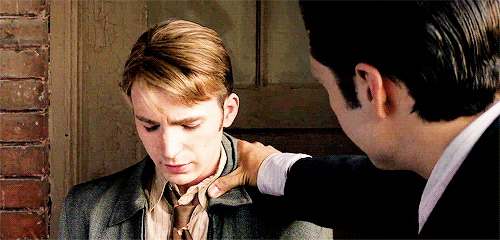
We can't talk about the final fight without talking about the emotional stakes, and we can't talk about the emotional stakes without discussing what Bucky means to Steve. We already had the "not without you" and the "I'm following the little guy from Brooklyn"; we've also had the "I don't want to kill anyone" turn into "I'm not going to stop until all of Hydra is dead" and the "I'm just a kid from Brooklyn" callback. This movie added the "even when I had nothing I had Bucky" and the "I knew him" and the "he will (know me)" and of course the "end of the line" exchanges.
But there were also more subtle cues -- that came from Steve's frequent rebuff of Nat's suggestions for companionship, the string of betrayals Steve had to grapple with, and Steve's lamentations of guilt and regret and uncertainty. Steve could not deny that he was lonely, but he had 101 excuses for why he could not make new connections. Steve did not know what he's looking for or why he's fighting or how long he wanted to continue, until he found out what was behind SHIELD and, specifically, what Hydra had done with Bucky.
Even removing the shipping angle, the final showdown between Steve and Bucky was unique in superhero movies, even for a friend-turned-enemy battle. It was not like the fight between Tony Stark and Obadiah Stane, or Peter Parker and Harry Osborne, or even Thor and Loki or Charles and Erik -- because there was no ideological divide between Steve and Bucky. Bucky did not and could not believe in the cause he's fighting for - he simply did not have that capacity for choice. The ideological battle was carried by the other characters - between Fury and Nat vs Pierce, between Sam vs Rumlow, and between the rest of SHIELD vs Hydra.
For Steve, his fight was much purer, dearer, and more heart-rending. The final battle held such emotional significance, not just because he's fighting his best friend, but also because his best friend was an unwilling participant in the circumstances. Bucky was Steve's physical equal, but he's also Steve's shared life experience, his tragically failed mission, his unfulfilled childhood promise, his betrayed faith in SHIELD, and the price that was paid for Hydra to grow under SHIELD's nose. This fight offered closure for all of these narrative and emotional threads.
He was also, once again, Hydra's asking price in exchange for the freedom Steve wanted for the world...and Steve so desperately wanted, this time, for that world to include Bucky.
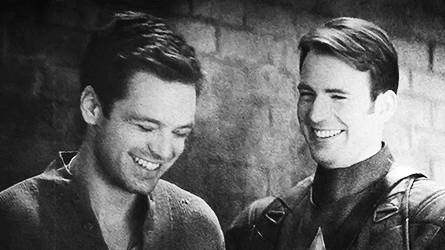
#bucky barnes#steve rogers#stucky#stucky meta#catws meta#should i have a tag for good script writing?#this is an example of a script that worked#long post
458 notes
·
View notes
Text
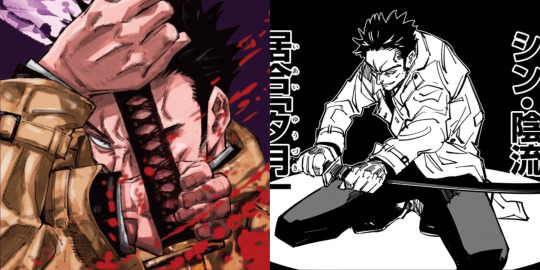

Kusakabe the Last Man Standing
Is Kusakabe going to defeat Sukuna all by himself?
Probably not. I fully expect Maki and Yuji to get back up and join the fight. However, Kusakabe is a character that has been slept on for awhile and with him being reluctantly shoved into the spotlight I think it's time to write a meta analyzing him. Especially since the revelation that Kusakabe is the strongest first grade fighter didn't come out of nowhere, in fact Gege has been building up Kusakabe in the background for quite some time which I'll explore under the cut.
So Okay, He's Average
I want to begin this analysis by saying that Kusakabe represents a type of character that Jujutsu Kaisen is desperately in need of. He's just a normal guy. He's our only example of an everyman character. Usually in manga the protagonist serves as the everyman character, especially ones like Yuji who come from a normal life and are being introduced to a fantastical world for the first time, but Yuji ain't normal. Someone who willingly eats a finger that may kill him just so he can be useful and save a stranger isn't normal. Gojo has Yuji pegged as one of the crazy ones within the first few chapters.
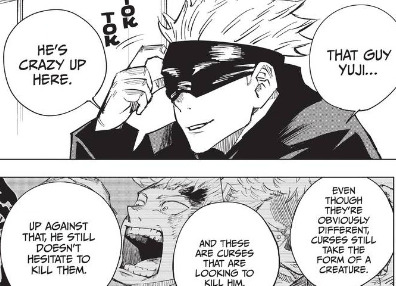
Gojo says that sorcerers have to be crazy, that the best Jujutsu Sorcerers need to be broken in the head otherwise they can't get over their fear of curses and risk their lives fighting them on a daily basis. The cast is full of eccentrics, Gojo the strongest of all isn't even able to relate to other human beings, Sukuna is termed a calamity, Yuta kisses cockroaches without hesitation there's not a normal one in the whole bunch.
The ones that are normal, like Miwa who acts like an average high school girl, has no technique, and Mai who desperately craves to be a normal girl and doesn't want to be a jujutsu sorcerer, either are minor characters or they die.
You could say Ijichi provides the point of view as a normal character, but he's a minor character at best and uninvolved in the plot. Then there's Nanami, who represents the typical japanese salaryman. However, Nanami is extraordinary in that he is far more moral than all of his coworkers, such as returning to be a sorcerer because the work helps people instead of keeping his cushy job, and prioritizing the lives of children over himself.
Us mediocre and average people are in desperate need for representation. Cue, Kusakabe.
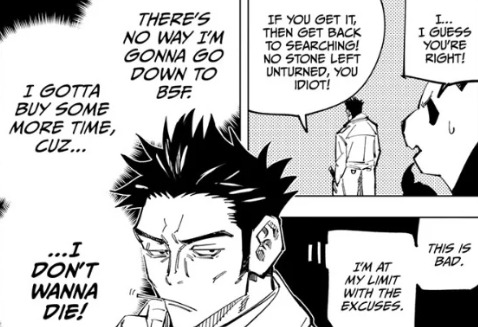
His introduction clearly demonstrates his attitude is different from most sorcerers, rather than running straight into danger, Kusakabe is trying to search for an excuse to stay out of danger where it's safe. While it's cowardly, it's also what a normal person would do in this situation. We are so used to sorcerers who either risk life and limb without a thought for the sake of other people like Nanami or Yuji, or sorcerers who enjoy the fight like Gojo that Kusakabe stands out.
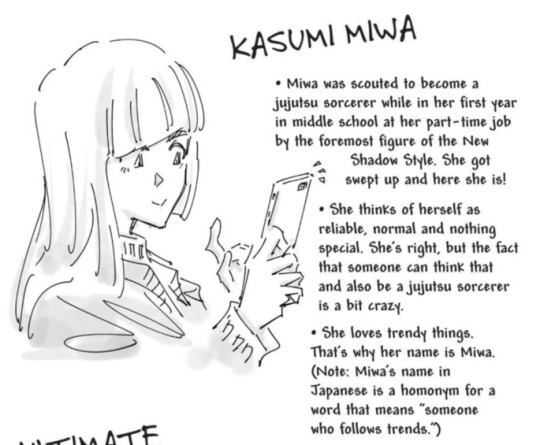
Miwa who is basically the example of the normal girl among the teenagers shares several parallels with Kusakabe, they're both simple domain masters without cursed techniques, they're both self serving, and also Kusakabe is her teacher and probably the one who recruited her considering he shows up to save her at the end of Shibuya.
Kusakabe is meant to represent what a normal person with common sense would do in the world of Jujutsu, but that doesn't mean he's weak. As I stated above Gege has actually been building up Kusakabe's strength in the background for quite awhile.
When training with Yuji, Gojo first brings up that some sorcerers rely on their techniques too much and that Yuji doesn't necessarily need a fancy technique to win, he can overcome them by learning to control his cursed energy and then using it to strengthen his already amazing martial arts skills and physical prowess.
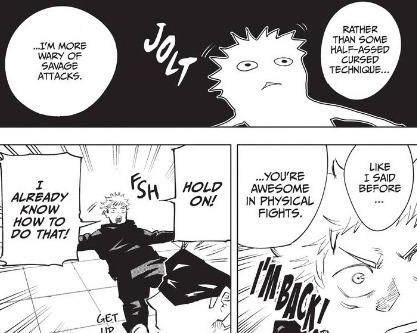
The Big Three clans like tend to overvalue inherited techniques too, the downfall of the Zen'in is that they didn't recognize the strength of people like Maki and Toji with no cursed energy because they believed their cursed techniques to be inherently superior.
In Mechamaru's fight against Mahito, Gege makes a big deal spending an entire page explaining the history and mechanics of simple domains. There's obviously no need to put this much attention into detail to explain simple domains unless they're going to come into play later, and while Miwa uses them as stated above she's a minor character.
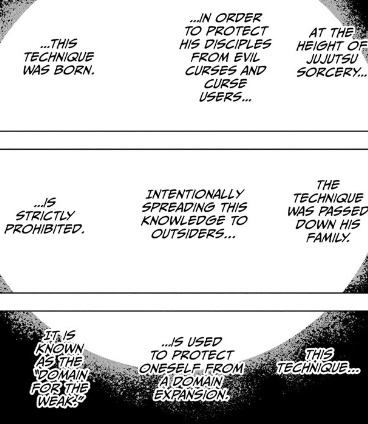
A technique called the "Domain for the Weak" what better technique for a normal guy like Kusabe, who is stuck in a cast of super-human characters. When fighting with Yuji, Mei Mei compares Yuji to Kuskabe.
"You're on par with a grade-1 sorcerer at this point. To be this good without a cursed technique... I think you're the only one since Kusakabe."
To further compare him to Mei Mei, Mei Mei monologues about how because her cursed technique of controlling birds is weak she tried to strengthen her body. However, eventually she hit a brick wall and couldn't get any stronger and reach Grade-1 on her efforts alone. Which is when she decided to start using Ui Ui as a tool to make herself stronger by making binding vows between him and herself to strengthen her, in addition to inventing her suicide crow technique.
However, Kusakabe is even stronger than Mei Mei and he managed to reach that level by himself without needing to groom and manipulate a child.
Kusakabe also spends all of Shibuya avoiding getting in a fight with a special grade cursed spirit, and yet at the end of Shibuya he ends up tanking an Uzumaki Maximum from Kenjaku at point blank. Kenjaku even praises him.
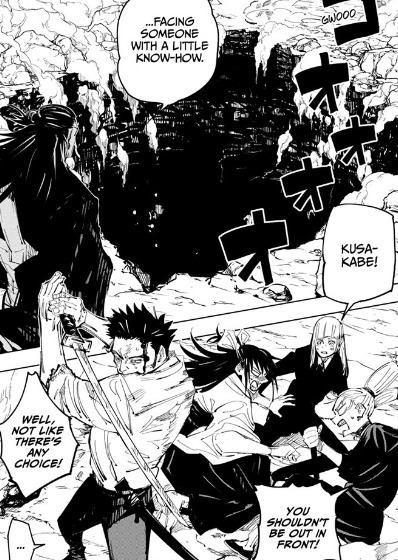
This is the same Kenjaku who can use Suguru Geto's cursed technique even better than Geto can, and who wiped the floor with Choso while bragging that a cursed spirit that's ranked Grade-1 like Choso could never go one on one with a special grade. We never saw Kusakabe directly fight Kenjaku (he would probably run in the opposite direction if given the chance) but the fact that he can use a simple domain to cancel out one of Geto's strongest techniques point blank is really telling.
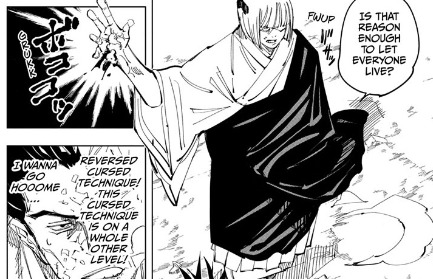
All the while having relatable thoughts like this one. In a lot of ways, Kusakabe reminds me of Todo, someone who Gojo mentioned as being one of the next up and coming star students alongside Hakari, and Yuta. Todo has a cursed technique that's simple but effective, but he also fights similiar to Yuji by his expert control of cursed energy. Todo fights mainly with his fists and martial arts and his impressive knowledge of how cursed energy moves though the body, his cursed technique gives him an added bonus.

Up until this point in the manga though Todo is the most knowledgable about cursed energy, he teaches it Yuji very easily and explains it in ways Yuji can understand. Fighting alongside Todo also brings out Yuji's full potential as a sorcerer. Todo is all muscle, but he fights with his head and is the smartest student in Kyoto.
All of this to say, Kusakabe's strength without a cursed technique can be explained by relating him to Todo. In the Gojo vs. Sukuna fights who is the main voice explaining to both the other students at Jujutsu High and the audience just how the battle is going down.
Kusakabe is not in there in the field, he's watching it on TV, and yet somehow he can disect and explain to the others how both Sukuna and Gojo are using high level Jujutsu Techniques. This is Sukuna and Gojo we're talking about, two geniuses who are the height of jujutsu and can often improvise and make up new techniques on the fly and yet Kusakabe is able to keep up with what's going on.

Kusakabe gives the play by play, he somehow knows what falling blossom emotion is even though he's not from one of the three big families. He explains to Hakari and Higuruma who are natural geniuses who don't quite understand how their powers work, how Gojo can change the conditions of his barrier and how exactly he made the barrier smaller.
Remember Kusakabe is also a teacher at Jujutsu High. Unlike Gojo who doesn't try to explain basic concepts to Yuji because he's such a genius, Kusakabe is also educating all of the students here and phrasing these high level techniques in ways they can understand. You can't really do that unless you yourself have an intimate understanding of the subject matter.
What I mean to say is by putting Kusakabe in charge of the discussion, Gege is demonstrating that Kusakabe is a character who understands the mechanics of cursed energy and domains on practically the same level as Todo who as we said is considered a prodigy. This is also some clever foreshadowing, because Kusakabe here seems like he's still a background character because all he's doing is essentially expositing to the audience and yet... how impressive must he be if he understands all of these advanced domain techniques when he's just a guy with a sword and no cursed techniques that uses simple domains.
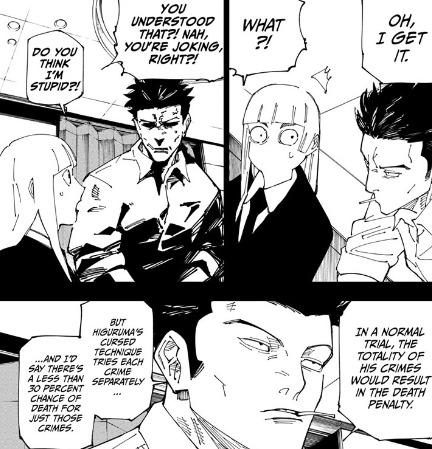
Kusakabe also understands Higuruma's legal talk in about ten seconds, and can explain the mechanics of Higuruma's domain and why their plan to put Sukuna on trial might not work. He is much smarter than he seems at first glance, Miwa even makes a joke about it. He even analyzes Sukuna's techniques after facing them head on once - and he's the only one who notices how odd it is that Sukuna's not using his fire technique like in Shibuya.
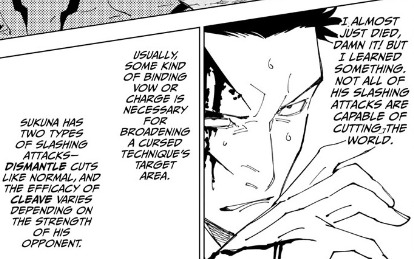
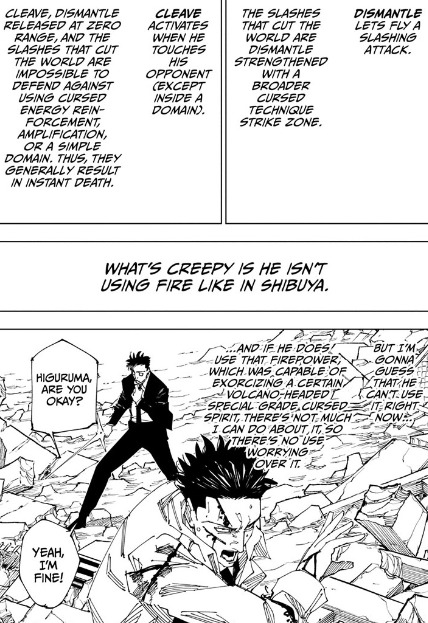
Sukuna mentions that Kusakabe along with everyone else's cursed energy reinforcement techniques must be on another level if they're able to stand up to his slashes (even if they're in a weakened state right now). After all, Ishigori who was not only one of the strongest fighters of his era but was also hyped up for his massive pool of cursed energy that rivaled Yuta's was torn to pieces by Sukuna's slashes.
Kusakabe also seems to be the one in charge of the strategy for the fight (though it was Angel's idea to let Takaba handle Kenjaku, maybe they're both coordinating but Kusakabe is definitely leading them in the field).
My point being, as much as he's accused of handling his large cast Gege is often able to give a lot of characterization in a limited screentime. Kusakabe is more than he appears to be, and it's clever how Gege built up his importance without anybody noticing, because Higuruma himself likes to avoid conflict, hide in the background and is constantly downplaying his own talents. Ino even made another joke about it last chapter.
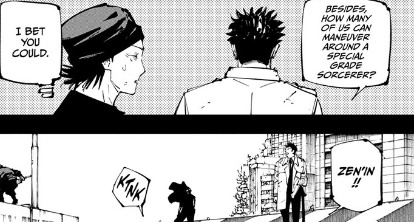
The commonly held view is that the sorcerers who reject their humanity and only care about refining their technique are the ones who become the strongest sorcerers. However, Kusakabe was able to climb to the top of the Grade One sorcerers despite lacking that attitude.
In my opinion, Jujutsu Kaisen is fundamentally about balance, so while there's a definite trend of Sorcerers who resemble Sukuna are the ones who become stronger - it's not presented as the only way to be strong. Yuji only defeated Mahito by cooperating with Todo. On top of that, Sukuna while finding Yuji boring admits that Yuji a mostly selfless person still demonstrates an indomitable will that Sukuna can't break no matter how hard he tries.
If Sukuna represents the thesis that the only way to become strong is to throw away all your humanity and become wildly selfish, then Kusakabe represents the antithesis as a mostly normal person (if a bit cowardly and self interest) who somehow climbed the ranks over people like Mei Mei who represent the kind of selfish monster Sukuna is.
This is actually the pattern for most of the Sukuna fights this arc too. Gojo and Hajime both represent the desire to be understood, and Sukuna rejects both love and says he doesn't need people to understand him because he understands himself.
Yuji is a human who is mostly selfless, and has inherited the curse of his fellow comrades as sorcerers, specifically carrying on the torch for Nanami who is also content to be a cog in the machine if it means he can help his fellow sorcerers out. Sukuna is a selfish monster, who is an individualist and sees other people as toys to amuse himself with.
Higuruma is a genius on the level of Gojo Satoru, but when challenged by Sukuna he ends up sacrificing himself instead in a direct parallel to Nanami in order to pass the torch onto Yuji.
Yuta's domain is literally called "authentic and mutual love" and Sukuna said to Hajime that he understands exactly what love is and he still rejects it. Sukuna's entire philosophy revolves around rejecting the love and friendship, while Yuta only fights for the sake of his friends, and can't believe that his life is worth living without people in his life who love him.
Sukuna gives a whole speech on how by rejecting cursed energy, and using a heavenly restriction to push her body to the peak of physical strength a human can achieve, she's forcing a role on Sukuna to compete with her as the peak of sorcery to determine which one is better.
Now it's Kusakabe turn to have a role in this fight too. While Maki has no cursed energy, she doesn't really represent humans because she's you know, a she-hulk. Kusakabe might be the most human character present that's willing to face down Sukuna. Kusakabe is the most human character someone who climbed this high without being born with any technique, Sukuna is the most inhuman monster in the series, a calamity that Yuji refers to as a true curse.
Gege even threw in these callbacks to Gojo panels.
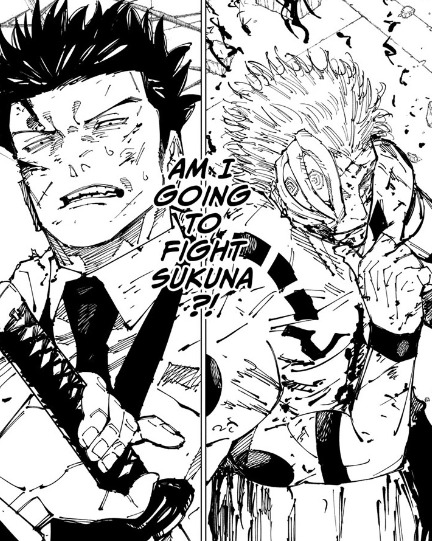

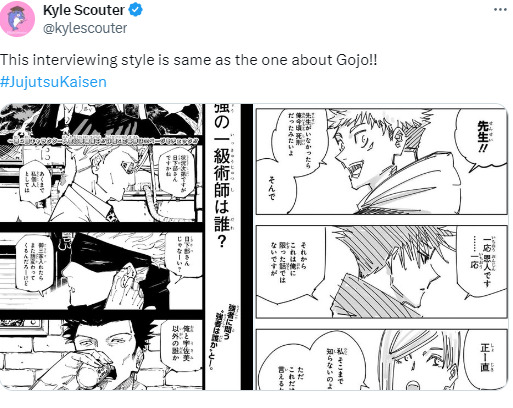
That in itself might be foreshadowing that maybe Kusakabe stands a better chance against Sukuna then anyone in the audience thinks. As the number #1 Kusakabe stan, I'm definitely willing to bet on those odds!
#jjk meta#jjk 253#jjk 253 spoilers#jjk spoilers#jujutsu kaisen 253#jujutsu kaisen 253 spoilers#jujutsu kaisen spoilers#atsuya kusakabe#ryomen sukuna#sukuna#gojo satoru#maki zenin#kasumi miwa
246 notes
·
View notes
Text
SPOILERS!!! REFERENCES AND EASTER EGGS IN F&C ep. 8: JERRY
The last of four posts for today.
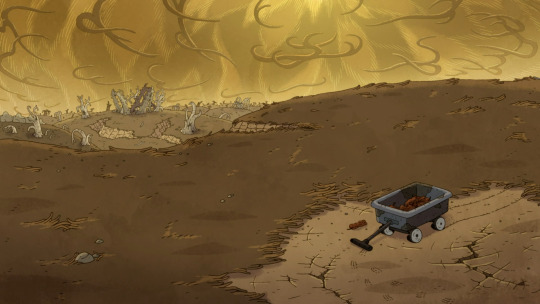
This episode has a very dark setting. This is the universe where The Lich wished for the extinction of all life. There is nothing here. This establishing shot features the Squirrel's apple cart, from a few episodes ago, but he is long dead and it is long abandoned.

We are introduced to a new cosmic entity, Orbo, who is Scarab's boss but is not to be mistaken for Prismo's boss, whose identity remains a mystery.
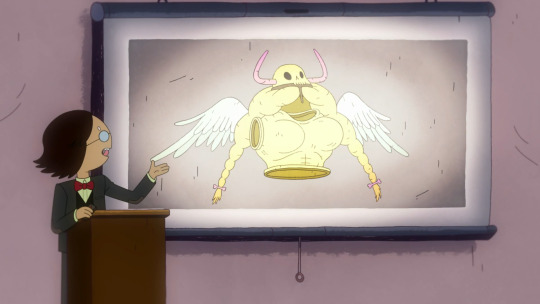
Simon name drops a whole bunch of magical items from the original Adventure Time series; the Armour of Zeldron from Blood Under the Skin, the Wand of Dispersement from Sons of Mars, the Porcelain Lamb from Beyond This Earthly Realm, and the magic beans from The Pods.
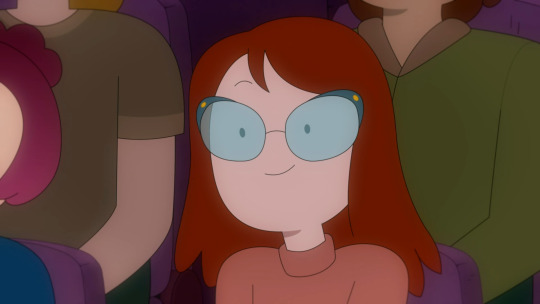
This episode suggests that the nature of Simon and Betty's relationship was initially quite unhealthy. He was one of her lecturers, and she had an infatuation with him from first sight.
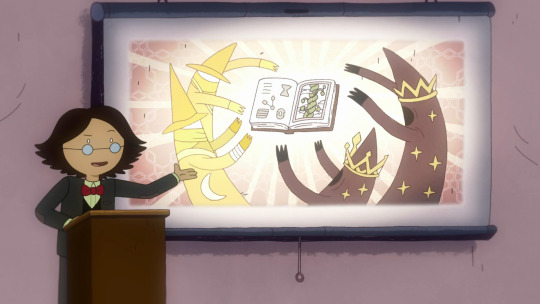
This illustration features the ancient wizards who sealed Coconteppi beneath Wizard City in the Distant Lands episode of the same name.
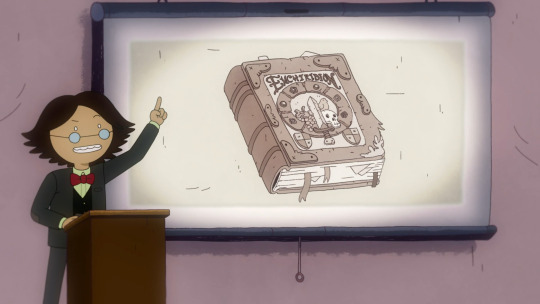
Simon's expedition to find the Enchiridion was first mentioned in the newspaper clipping in I Remember You, and was mentioned again in Temple of Mars.
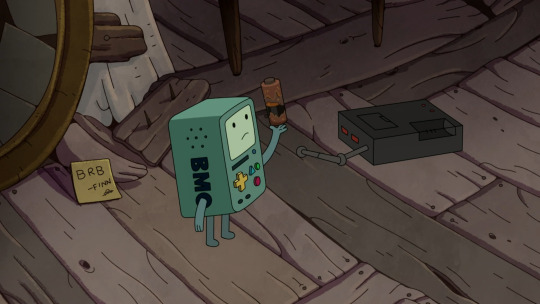
BMO apparently survived The Lich's wish because he isn't technically alive. I wonder where Neptr and the other MOs are. Cannibalised for batteries, perhaps. Also, that BRB note is very sad and is identical to the one Finn wrote in Blenanas.
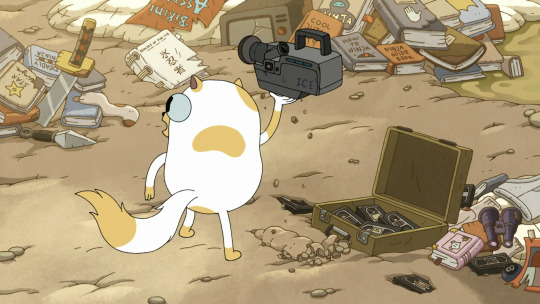
There are various familiar items in the thawed out remains of the Ice Kingdom; ninja paraphernalia from The Chamber of Frozen Blades, Ice King's diary from The Empress Eyes, and of course the tape collection from Holly Jolly Secrets.
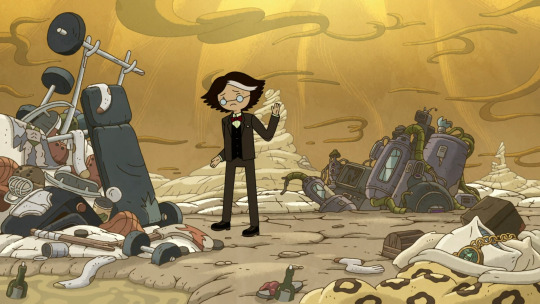
Here's a deep cut: That machine in the background to the right of Simon is the machine that held the lightning power that Finn went to steal in What is Life, so that he could power up Neptr. The Demonic Wishing Eye is also in this shot.
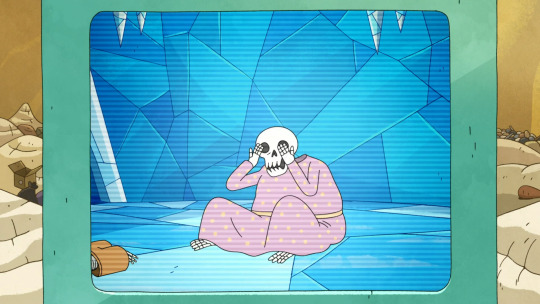
For a single frame, Ice King and Gunter can be seen reduced to skeletons. Presumably this was the exact moment that the Lich's wish took effect. Everyone died instantly, in less than a frame.
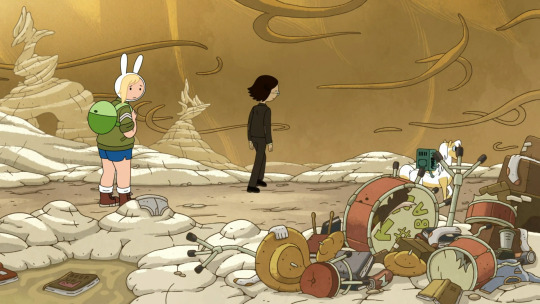
When I watched this episode for the first time I was confused about where Fionna got the working crown. But you can just about see it inside the drum in this shot, where Ice King mentioned he had put it in his tape.
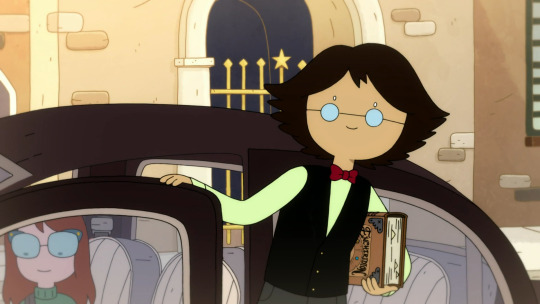
This is the exact moment the photograph was taken for the newspaper clipping seen in I Remember You.
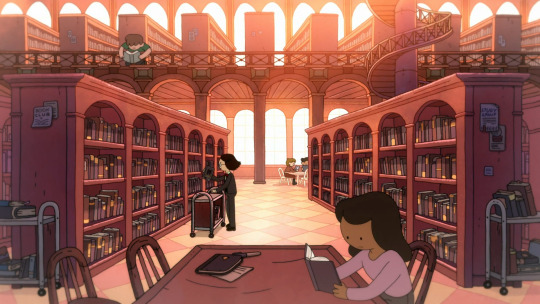
We first heard the story about how Simon met Betty after they tried to check out the same library book in Broke His Crown. It's cool to see it playing out for real.
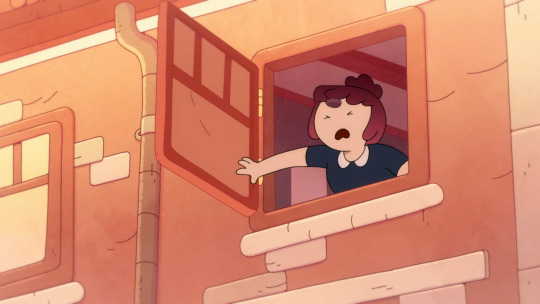
Simon throws a pebble at the window and accidentally hits Babette in the face, exactly like Finn and Jake did to Kim Kil Whan in the episode Ocarina.
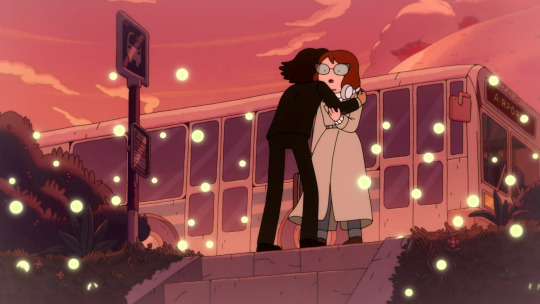
This is the second time Simon caused Betty to miss this research trip to Australia. She says in Temple of Mars that she never got the opportunity to go, and resolves that her life might not have been so messed up if she'd followed her own dreams instead of following Simon's.
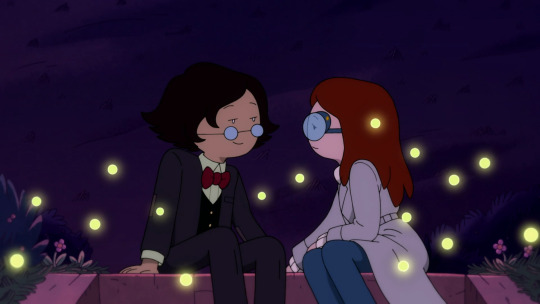
The song in this scene, the motif of which has been heard throughout the series, is by Half Shy, who also wrote "Monster" for Obsidian.
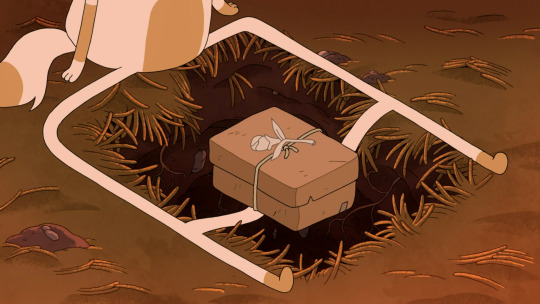
BMO is buried with a paper flower because there are no real ones left alive. His death seemed pointlessly cruel.
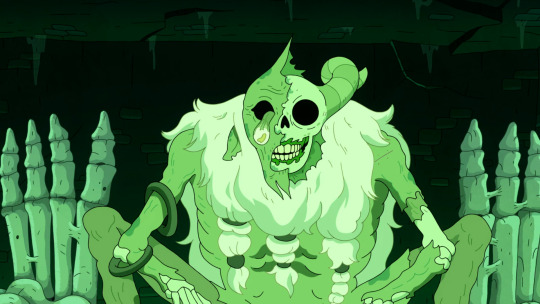
THE LICH! He is in his half-disguised Billy form, confirming that this is his wish-altered reality. Like in his other appearances, the first line he speaks is a single word command. This time, the command is "Cease." But with nothing left to do he has become depressed, and he doesn't bother killing our protagonists.
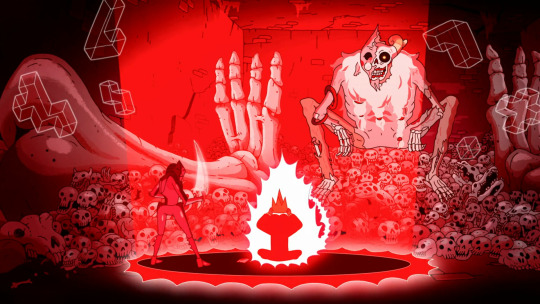
And finally, we are left on this cliffhanger. Fionna and Cake have returned to their world. Scarab has convinced the boss that Simon must be destroyed. And GOLBetty is here to claim them both while the Lich watches on.
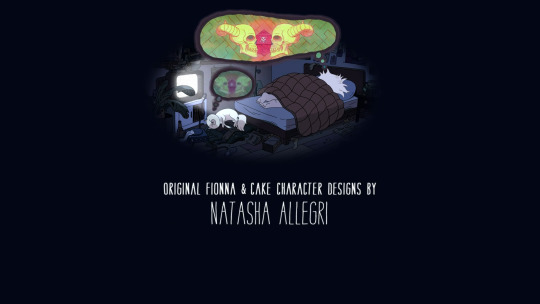
This episode's dream features a pair of Lich skulls either side an effigy of GOLB.
414 notes
·
View notes
Text
Welcome to another round of W2 Tells You What You Should See, where W2 (me) tries to sell you (you) on something you should be watching. Today's choice: 重啟之極海聽雷/Reunion: The Sound of the Providence/The Lost Tomb Reboot/this thing has too many names

Reunion (I'm just going to call it that) is a 2020 action drama about the most specialest little babygirl in the tomb-raiding world, his two husbands, and the cadre of assorted weirdos they pick up as they try to follow a set of directions left by a dead (?) man in the thunder.
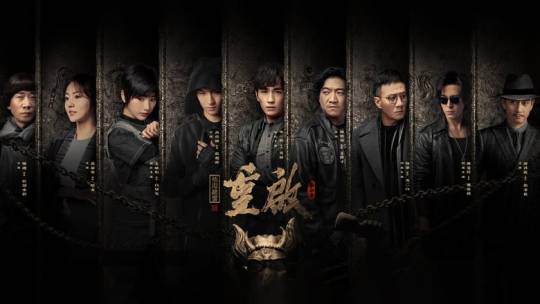
Imagine if someone showed you the Mandalorian, and you were like, gee, that was a neat little sci-fi one-shot! because you'd never heard of Star Wars. That was basically my experience watching this show, having no idea that the Lost Tomb franchise (DMBJ) was even a thing. Turns out that not only is there a whole big continuity out there with these characters, but that Reunion takes place a few years after the main story's resolution. Don't worry, though -- Reunion doesn't spoil you for that resolution. It doesn't spoil you for much, period. Look, DMBJ has a weird relationship to endings, okay?
I have written a more thorough where-to-start guide for DMBJ as a whole, so if you want to consider other entry points, well, that information is there for your consideration. Yet it is my opinion that this is the best entry into the overall franchise, and a fun thing to watch just in general, and I'm here to make my case for both of those.
The rest of this rec will assume that you have no familiarity with the DMBJ series. That's okay; you don't need any. All you need is to trust my five reasons you should watch this.
1. Old Man Yaoi

As you begin this show, you are introduced to the Iron Triangle. That's them in the picture up there. Left to right, you have: Xiao Ge, magically tattooed immortal hottie who just got back from ten years in [scene missing]; Wu Xie, our protagonist, who's just a little guy and it's his birthday; and Wang Pangzi, the literal best.
(And yes, Wu Xie is in his 30s and Pangzi is in his 40s, which is not technically old man anything, but ... look, if you watch, you'll see why I think I'm justified in calling it that.)
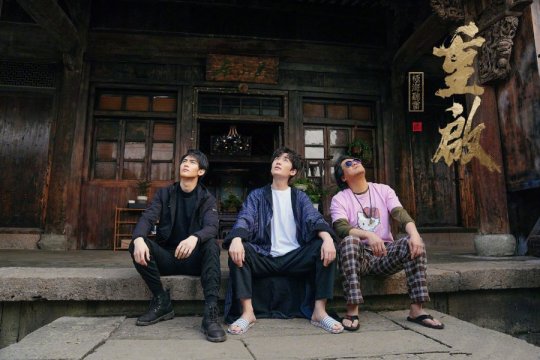
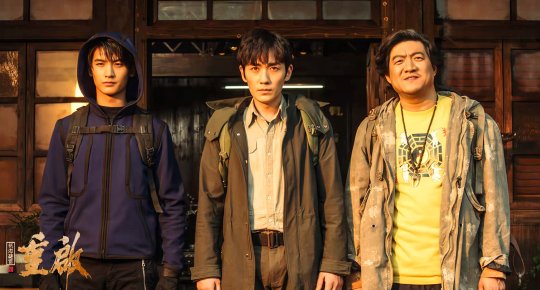
They are extremely married. They are a disaster trio of disasters so disastrous that no one else should ever be subjected to their chaos. They're going to make sure lots of people are, though, don't you worry about it. Sometimes those people even deserve it.
However, because the show (tragically!!) decides that Xiao Ge has somewhere else to be like 95% of the runtime, most of the relationship you get to see is between Wu Xie and Pangzi.

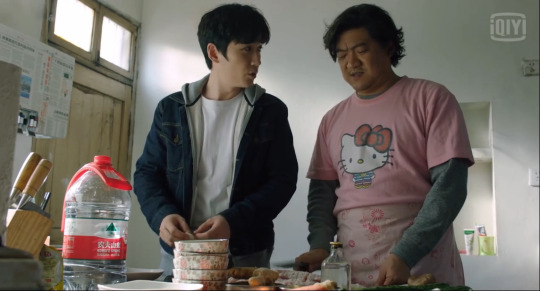
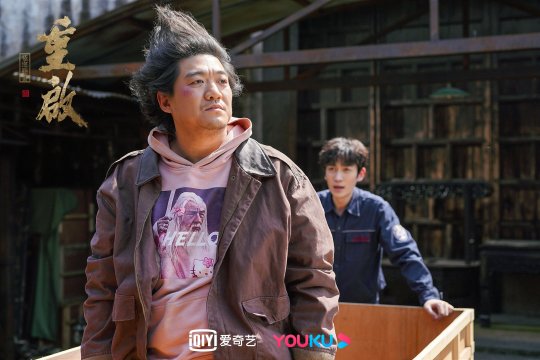
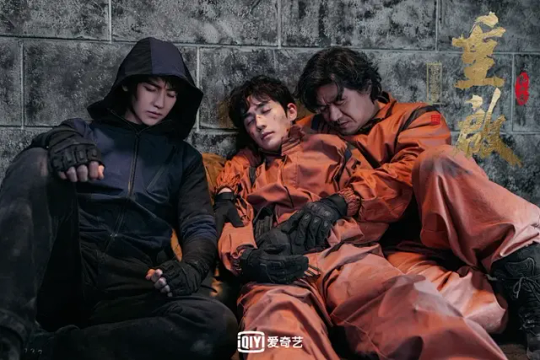
I'm saying this now as an old gay nerd who just this year celebrated her 15th wedding anniversary: I have never, never felt so represented in media as I have watching Wu Xie and Pangzi interact. There's a little wake-up song they sing together near the end of the show, and it just ... it packs so much character development into thirty seconds. These boys have been living adjacent lives for so long that they've made up their own little shared songs about the mundanities of daily living. That is just what happens when you marry your best friend and then decide to get old and weird together. Ask me how I know.
Look, if you want to know whether this show is for you or not, watch to the end of the first episode, to the part where Pangzi flips over the table. If your heart is filled with joy (as it should be), keep going.
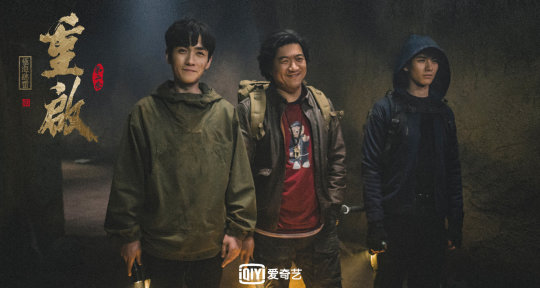
Love makes a tomb-raiding syndicate family.
2. A fun-filled action-packed romp of nonsense!
If you're familiar with Hellblazer canon, this will make sense to you: Reunion is Dangerous Habits. If you're not familiar with Hellblazer canon, try it like this: Reunion is a terrible place to start because it plays on your extant affection for a character who gains a terrible status effect almost immediately. It's a also great place to start because it throws you right in the action with measurably high stakes and gives you a reason to build that affection very quickly.

I'm also going to warn you right off the bat: The plot of this show got cut to ribbons by censors.
See, the DMBJ books, being books, are allowed to get away with supernatural shit! So you've got zombies and ghosts and curses and monsters and immortality and all your other standard ooky spooky semi-urban fantasy trappings. But the DMBJ adaptations, being live-action, are heavily regulated in their content. This is why, in the early Reunion episodes, our heroes are menaced by human-looking creatures that are actually ancient mannequins made of leather that are piloted, mecha-style, by evil clams. Because evil clams are more scientific than zombies. I guess.
So yeah, the plot of this book already had to get mangled into a more "science"-compliant shape even before it made it to filming. The real problem is that a whole lot more of it got cut after it was all filmed and put together. I have read an explanation of what the actual storyline was supposed to be, and yeah, if you know what you’re looking at, you can see (and hear) the scars where major elements got hacked out with a weed whacker.
Therefore: You cannot expect this plot to make sense.

But that's okay! You're not here for the plot to make sense! You're here to watch some characters you love run around through ridiculous and sometimes beautiful labyrinths, trying to solve puzzles you're never given enough information to understand, all in search of the resolution to a mystery that had half its guts torn out before you got to see it -- and you are here to love it. If you have ever laughed and cheered your way through a Mission: Impossible film without pausing to care too much about the plot holes it’s dodging left and right, you are in the correct frame of mind to appreciate this. Just believe that whatever engaging nonsense the show tells you is correct for the time being and go with it.
You cannot watch DMBJ and care about the laws of physics. You simply cannot.
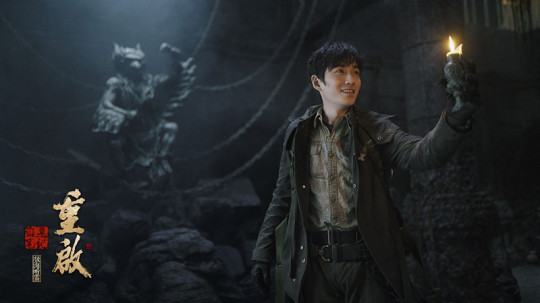
Do not, however, let me give you the impression that the shoddy plotting is accompanied by equally shoddy performances. A major part of this show’s incredible watchability comes from how the cast is shockingly good. There are some serious heavy hitters among the actors. A major part of why this Wu Xie and Pangzi are my favorite together is the incredible chops both Zhu Yilong and Chen Minghao have, to say nothing of their real-life affection for one another. (See that scar on Wu Xie's neck? That scar is there because Zhu Yilong commits to the bit.) Effortlessly charming Mao Xiaotong turns potentially irritating wunderkind Bai Haotian into a perfect precious weirdo baby. Wu Erbai's entire second-season character arc could have been unintentionally comedic, but veteran of queer cinema Hu Jun sells even the undignified moments as relentlessly tragic. And of course Baron Chen absolutely kills it with...
3. This giant fucking loser
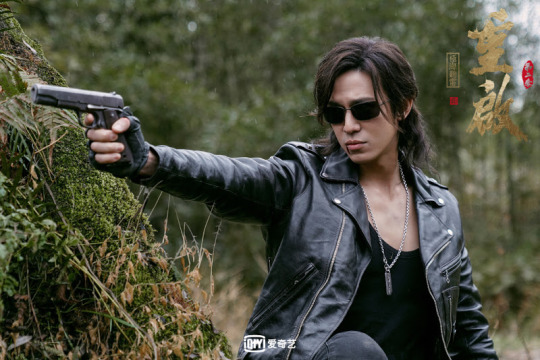
This is Hei Xiazi. That's not his name, but it's close enough. Allow me to do a dramatic reenactment of my watching his first scene:
[camera pans over to him]
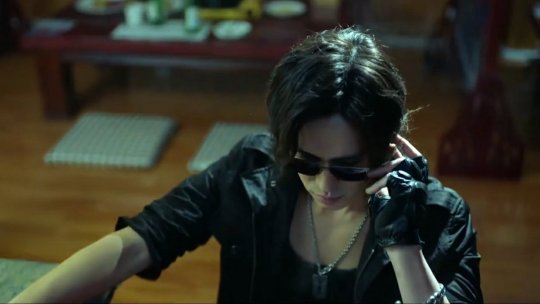
me: Ugh, I recognize this kind of wannabe badass character design. I hate his type. He's self-important, hyper-masculine, and just a big jerk, and the show thinks he's soooo cool. Barf.
[thirty seconds later]
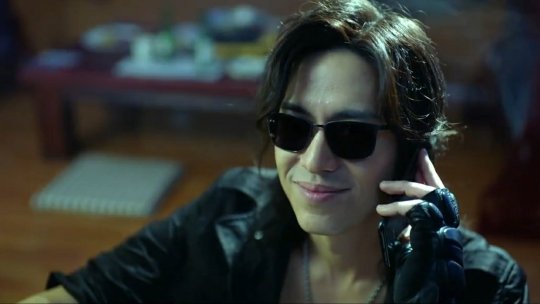
me: Oh no. I was so wrong. I love him forever now.
This is because he is (as indicated above) a giant fucking loser. Yes, he's a good fighter who knows lots of things. He's also a wet potato chip of a man. Sure, he can get you into a headlock, but he can also annoy you into submission, and that's honestly more fun for him. My wife has used the phrase “Vash the Stampede-coded” to describe him. My wife is not wrong.

And the kind of ridiculous thing is, being such a loser is what wraps back around to making him cool again. He's a loser because he just doesn't fucking care. His masculinity is the opposite of fragile. You tell him to wear a dress and makeup, he'll do it -- and sure, he'll complain, but only because he enjoys complaining. He has no dignity. He’s tits-out. He's gender. He's the worst and also the best.
Hei Xiazi is a major character in the other installations, to the point where he and his boyfriend (more on him later) even have their own movie. But of course, I did not know this on my first watch, so I kept expecting the show to explain his whole deal. It does not, but you don't really need it to. He sees better in the dark. He doesn't age. He's a thug for hire. There, that's all the bio you need.

One of the things that makes him great is that he is the least sexually threatening person ever. Across all the properties he's in, he spends a fair amount of time with women -- sometimes in very close quarters -- and they are perfectly safe around him. I actually wrote a whole post about it once upon a time (warning for tiny spoilers for a series that isn't this one) wherein I claim that not only Xiazi but Reunion in general is the television equivalent of the shirt that says I RESPECT WOMEN SO MUCH I DON'T HAVE SEX WITH THEM.

That said, this loser does get a sort-of romance plot here -- and honestly, I find it very cute! It's not even the only instance in this series of a bisexual guy in a long-term same-sex relationship getting a girlfriend, and I like that other one too! Look, the handle of my DMBJ sideblog is @katamaricule because I joked that Wu Xie treats polyamory like a katamari, and if you don't move fast enough, you're going to be rolled right up into his gay little cuddle puddle.
This is not a show for exclusive ships; this is a show for inclusive ships. The Jiumen Association is a polycule. You don't even have to know what the Jiumen Association is to know it's true.
4. The power of friendship
This show has a lot of characters.

I'd say the supporting cast is divided into three categories: characters who have been in previous installments, characters who have not been in previous installments, and characters who probably should have been in previous installments (or at least mentioned) but who were only created for Reunion so we have to pretend like we've known about them all along.
There is no way to tell which is which -- which is part of my argument that this series makes a good entry point to the franchise.

Take Huo Daofu. Huo Daofu is a brilliant doctor masquerading as a donut stand operator who treats Wu Xie with all the cold disdain of a man confronting the person who left him at the altar years ago. On the one hand, yes! We do know Huo Daofu from a previous series, and we've known he's both a doctor and a bitch. On the other hand, oh, we have no idea why he's like this about Wu Xie, and we probably never will. The show just treats it like it's for an excellent reason, and you know what, from what you know about Wu Xie, it probably is.

Consider also Jiang Zisuan. One of the show's principal antagonists, Jiang Zisuan turns out to be the brother of ... well, let's just say it's someone whose having a brother really should have come up before this. It has not come up. (And that's even before we get into the issue of his surname.) His stated identity as that person's brother is so bizarre that my favorite interpretation is that he isn't actually that person's brother -- all the flashbacks we see are just his delusions about a relationship he's completely invented. But there's no way you'd know how fucking weird this is on your first run.

Then there's our friendly little support himbo, Kanjian, who shows up to all occasions with two tickets to the gun show and not a thought in that beautiful head. (His name just means "vest," which is par for the course when it comes to the author's naming conventions.) He was a lot more menacing in the last series (where they kept putting sleeves on him, geez), where most of what we learned about him is that you can loan him out to other tomb-raiding families. Now he's a golden retriever with great aim and a slingshot. It's an upgrade.
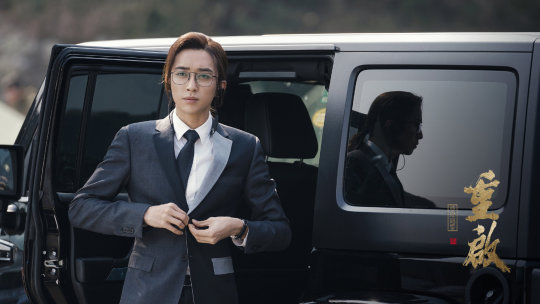
The trick is, you cannot be surprised when someone shows up and the show treats them like you should know who they are, even when there's no possible way you could know who they are. I mean, for heaven's sake, Liu Sang arrives in the middle of an obvious beef with Pangzi, the origins of which are never satisfactorily explained, while also having a giant do-I-want-to-fuck-him-or-do-I-want-to-be-him crush on Xiao Ge, which is also never satisfactorily explained. Whatever, you just roll with it. He's got good hearing, a bad attitude, and questionable taste in idols. Now you're good to go.
(I should throw in a special note here that Liu Sang is many, many people's little meow meow, and not undeservedly. For a fuller explanation of why that is, please consult this other post I made.)

Part of the fun of this big cast is the adorable interactions you get. All the characters have appropriately big personalities, and the show loves letting people you wouldn’t expect bounce off one another. It’s not your typical action-hero show where nothing happens without the protagonist in the room. There are lots of exciting combinations and tons of charming dynamics! Unlikely friendships form all over the place! Enemies become allies! Allies become friends! Friends become friends with other friends! Some friends become enemies again! You'll need a scoreboard to keep up!
This is not to say the show treats all its characters perfectly or equally -- one of the precious few main female characters doesn't even get a real name, for heaven's sake, and the less said about the brownface racism, the better. It is, at its heart, a dude show for dudes made in China, with all the troubling decision-making that implies. Where it does deserve credit, though, is in understanding that its supporting characters are actual people with personalities apart from their function in Wu Xie's narrative. Sometimes the show just asks "what if [random character A] and [random character B] had to interact?" and has fun considering the answer! Which is almost always a delight to watch, and sometimes even breaks your heart.
5. Amazing rewatch value!
And by this I mean the experience of watching this show is remarkably different once you have any understanding of the rest of the DMBJ universe.
For instance, there's a point where two characters are scuba-diving past some submerged coffins, and one character tells the other whose coffins they are. Working only on information Reunion has given you, you're like, oh, that's where they buried the guy who built this creepy place, that's a little weird. Once you recognize that name from other series, though, your reaction is far more, excuse me, they did WHAT to WHOSE corpses?
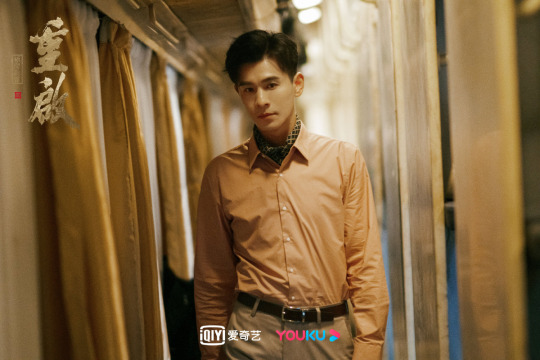
Or another point where a character you've already met is on a train, and there's a handsome gentleman who just happens to be riding with her. He hands her his business card! Aw, that's sweet, he seems like a nice guy! Well, no, Xie Yuchen is not nice, but he is one of our allies, and he's Hei Xiazi's boyfriend, and a lot of what he's doing hits real different when you have a fuller grasp on why he's doing it and for whom. (Honestly, a major reason to watch Reunion first is so you're not fully and appropriately upset by how your black/pink gays merely have one teeny tiny scene together.)

From the way the series treats the persistent absence of Wu Sanxing, Wu Xie's third uncle, I absolutely, 100% assumed that he was a completely new character to this installment of the series, an extremely long-lost relative that we've somehow conveniently managed to never talk about before now. So imagine my gobsmacked surprise when I went to watch a different series, set much earlier in the timeline, where the opening scene prominently features Wu Sanxing as an actual character in the present-day narrative! ...Well, sorta. Look, there's a lot of fuckery with his identity in earlier parts of the story, and fortunately you need to know none of it to understand Reunion. But when you do, it suddenly makes a lot more sense why Wu Xie talks about someone who was a major part of Wu Xie's adult life like he died when Wu Xie was nine.
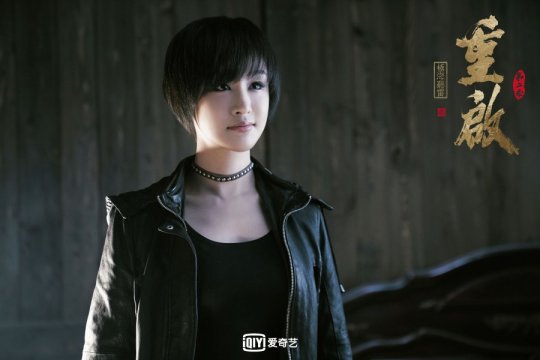
AND THE FLASHBACK SCENE WHERE A-NING GETS KILLED BY THE SNAKE, AND YOU'RE LIKE, OKAY, AND THEN YOU WATCH ULTIMATE NOTE AND IT WASN'T LIKE THAT AT ALL look, I know there are kinda reasons for this, different production companies and all, but seriously, what the fuck

All of which to say is that the experience of watching Reunion the first time is, hey, this self-contained romp is a lot of fun! The experience of rewatching it after watching any of the other DMBJ installments is a transcendently wonderful head-clutching avalanche of one moment of recognition right after another.
And here's the thing: You will watch more. Reunion is a gateway drug. If you are interested enough to make it through all 62 episodes, you're going to be interested in watching more. Which is great. The English-speaking fandom needs more people. Come down into the tombs. It's great down here. We've got snakes and arguably unintentional homoeroticism. Join us. Join usssssssss
Are you ready for an aventure?
There are a couple different ways to watch the first half, but there's (weirdly) only one way to watch the second, so for both of them, I'm going to send you straight to iQiyi: Season 1 (32 episodes) and Season 2 (30 episodes).
And just so you’re ready when Reunion is done, here’s how you find the rest of the DMBJ series, in the absolutely non-chronological order in which I, personally, think you should watch them:
The Lost Tomb 2 (AsianCrush, YouTube)
Ultimate Note (iQiyi)
The Mystic Nine (iQiyi, Viki)
Sand Sea/Tomb of the Sea (Viki, WeTV, YouTube, also YouTube)
Also, there's a lot of movies and side series and other pieces that are worth seeing, and even a couple of full series I've left off the list, and you can just slot them in wherever. And maybe we'll get Tibetan Sea Flower someday? Look, hope springs eternal.

They're so perfect. Perfect triangle. Perfect boys.
#dmbj#重启#重启之极海听雷#盗墓笔记#Reunion: The Sound of the Providence#the lost tomb reboot#rec post#i made this
141 notes
·
View notes
Text
It sounds so self-obvious when you say it aloud, but the key to writing romance is that the characters need to be into each other.
I've seen so many so-called "romances" in mainstream movies and shows that somehow fail to achieve this very simple principle. Usually they're het romances but not always. I've also seen established lgbt+ couples who we're told are married but who never show any particular interest in one another to confirm this supposed love in a show-don't-tell manner.
Below the cut I want to explore how to write love (romantic or otherwise), what makes it work in fiction, and the important difference between why characters fall in love vs. why they choose to pursue or stay with the person they fell in love with, because those distinctions matter.
Let's quickly touch on failed fictional relationships before moving onto functioning ones. Because the thing is, it's important to flesh out relationships and romances if they are written into the story even if they aren't the focus of the story or they are doomed to fail as part of the plot.
I see it a lot of times in fictional relationships that are clearly plot points and so the author doesn't bother to invest in them. If a relationship is established with the protagonist just because this current partner is going to break up with them, thus launching our actual romance plot, then there's a temptation not to fully flesh out that doomed-to-fail relationship.
But to skate over the failed relationship is a missed opportunity for a writer. Relationships reveal a great deal about us, as do failed ones. Even if the relationships don't work out, we get the chance to learn what the protagonist is looking for in a relationship, what didn't work in the failed one, and we get to learn more about their love language. This also requires that we see these romantic partners are into each other, or were into each other, and how, before it went sour. Even if it's one sided and doomed to fail, we need to see what the infatuated side of the pairing was into about the other person. Even if it's just physical, that too is revealing.
Romeo was in love with Rosaline before he fell in love with Juliet. But we don't skate over what he loved about her. We learn that Romeo frequently falls in love, he's often impetuous in love (which we will see carried forward later in the famous balcony scene with Juliet). We learn that he is poetic about that love. We learn how much he loved Rosaline, and whether or not we believe he was in love or think that love is wise, it is important for establishing later, when he meets Juliet, the order of magnitude difference between his love of Rosaline and of Juliet. One left him broken-hearted when he lost her, but he quickly recovered. But Juliet? He was willing to die for love of her. The love of Rosaline set up the contrast in how Romeo loves that would be massively important to the impact of the story later.
I bring up this example because many years ago in a high school lit class, the teacher said that Shakespeare never explains why characters fall in love, and so writers don't have to explain why characters fall in love.
It didn't quite sit with me right, because I think it's only half true. The full maxim, and what writers today can learn with regards to romance is:
You don't have to explain why characters fall in love. You do have to explain why they stay together and/or pursue that love.
Actually, it's often better to not explain why a character fell in love. It's ineffable. It just happens. How often have we met or been introduced to someone who is, on paper, perfect for us with similar interests and compatible families or lifestyles, only to not feel any sort of spark? How many grand romances, in contrast, are about people who on paper are terrible for each other but just can't seem to quit one another and keep being drawn back together?
This doesn't just have to apply to romantic love, by the way. How many people are inevitably drawn back to toxic or abusive parents, even though they know this person has a negative impact on their life? How many people stick it out for friendships that damage their health and self-esteem, all out of love?
Again, you don't need to explain why someone loves, but you do need to explain why they pursue it or stick with it. The reasons can be societal, they can be because of guilt, they can be because of adrenaline, or because of long history together, or if it's a successful romance, it can be because they don't just love each other, they also really really like each other!
Now, this might seem somewhat inherently self-contradictory. I'm saying you have to show that people are into each other but that you don't have to explain why they fell in love??
But showing that people are into each other is actually about why they pursue it and stay with the person. The falling in love itself is simply the gravity between them, the magnetic bond, what draws them together. In fiction, we want that to be powerful, overwhelming, inevitable. If the story is about love, we need to see why these people can't walk away, or can't walk away for long, or are miserable when they do. They are drawn to each other, powerfully, destructively or gloriously.
But you can be drawn to someone without having a single conversation or knowing anything about them. We initially fall in love with our image of a person, what they mean to us, what we think they will be in our lives. Real love is about learning who the real person is and continuing to love and to like that person. Real long-term love is loving that person even when they change from the one you first met, and they love you too as you change. But the opposite of love is not hate, it's apathy. The love is the pull.
Why characters are into each other, or why they like each other, is the force that makes them continue to pursue that person. The love itself can be the thing they're into, by the way! "I can't get this person out of my head, I can't put it in words, but they haunt me and I'm into them for that," is a totally valid way to build a romance or character relationship without any other things that they like about each other!
But as said, it can and probably should be more than that in a successful love story. The construction of the love and like of the relationship can also be Love + Long History + Physical Attraction + Deep Understanding. Gomez and Morticia Addams love each other, they'd love each other if the other was unconscious, they'd love each other to the grave and beyond. But they're also into the fact that they're both incredibly extra romantics who love demonstrating their fascination to each other, in ways presumably no other partner could keep up with. They waltz at odd hours, engage in thrilling sword fights, raise a family together based on their shared worldview, and stare deeply into each other's eyes at every opportunity. They don't suffer one another, they adore one another's presence and quirks and foibles. They are seriously whackadoodle into each other and we see it in the joy they take in one another, how much they like each other in addition to that love.
Characters who are in love should be obsessed with something about the person. Remember, these aren't real people, I'm not giving real world relationship advice. This is fiction. You can write a tepid relationship but it will be sort of boring to read. That might be the point! The tepid relationship might be in contrast to your protagonists, for example!
But my point is that in all fictional relationships there should be something in which the characters are each other's biggest fan. In mother/daughter familial love, they might love one another's outspokenness on what is important to them, we can see their eyes shine when the mother or her daughter gives that big important speech, filled with love and pride for them, and encouraging their outspokenness at every turn, inspired by it.
If the love is between two brothers, related or otherwise, we might see that love in darker times. A brother has to pick up the other from jail. It is painful, heartbreaking, but he can't turn away, he can't not do it. That's love. But, maybe the brother he picked up cracks a joke on the ride home, makes the other laugh despite himself, and suddenly, he remembers the good side of the love too, that his brother can always make him laugh. This is important because it shows us not just that these brothers love each other, but why they continue to interact with each other despite the pain and disappointment. That might actually be tragic rather than happy. One brother might not be able to escape because of the other's ability to make him laugh. That too is love, not just the magnetic attraction of it but the reason it continues to draw them together inevitably, that ability to understand one another and make the other laugh, when he really should probably walk away for his own sake.
The reason so much slash shipping exists in fanfiction is because very often, platonic love is fleshed out in the mainstream more often between two same-sex characters with greater depth than romantic love. A mainstream show might present us with a couple who we are told are attracted to each other and from there the writers assume that is enough to explain why they got together. Nothing deeper. No spark of liking one another in addition to wanting one another.
But in a buddy cop film, the buddy cops are usually obsessed with each other. They stand up for one another when the chips are down, they save one another in moments of peril, they look into each other's eyes and discuss what is important to them in life, like solving the mystery they're working on, and in doing so find understanding with one another's worldviews. That is infinitely more satisfying as a love story than simply telling me that a beautiful Barbie and Ken of main characters have slept with each other and therefore are dating and "in love".
Obsession is key. But don't get too bogged down in how the love exists. It exists because that's love. And we are fascinated in fiction by powerful love of all sorts. We love characters who don't just suffer each other but are into each other, ludicrously, obsessively, even tragically. Turn up the love to the whackadoodle maximum and break off the knob and I guarantee, you will at the very least have characters that people will watch with interest. We love characters who are obsessed with something, or someone. Their love reveals to us what is lovable about that character or thing, it makes us love them.
And then, because love alone is not always enough, show us the joy that keeps them coming back to each other. Show us some good times mixed in with the bad, tragic as they might be for how they prevent the cutting of ties that maybe should be severed. Show us why they can't give up and walk away. Show us too why they like each other. That is what draws a good love story together.
507 notes
·
View notes
Text
urs // Mingyu Series - Part 2
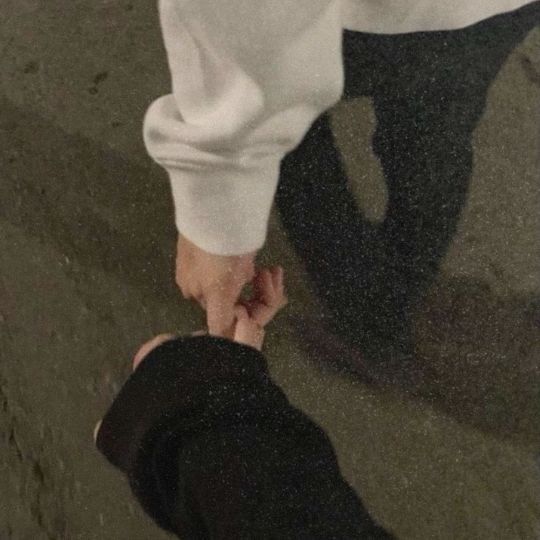


"the best at being the worst... but fuck sake I'm already yours"
DESCRIPTION: she and mingyu were in no place to be in a relationship. she was his best friend's stylist and he was... well he was kim mingyu; something stable was not something that was ideal for the two – not when their careers are both at it's peak.
PAIRING: idol!mingyu x stylist!reader
GENRE: angst
WARNINGS: mentions of alcohol, implied smut, stubborn protagonists, so many red flags you would think this is a football game, features the love of mingyu's life (jungkook) and all his other besties
NOTE: if you read INFRUNAMI, no you didn't. this has the same-ish vibes BUT this is the re-written version. many events, actions, and overall plot has been changed. (even if the intro/first part is very similar)

"Are you really not going to come with me?" Mingyu watched her move about her room.
He had shown up to her place unannounced – letting himself in, using the pin-code he had memorized by heart. This was one of many occasions he had put the four digits into good use; at times paying the apartment a visit even when she was not around.
It was the one location no one dared to bother him; mostly because those who were in on their arrangement knew that his presence at the place shouldn't even exist.
It was his new safe haven; a place where he can hide out when his schedules seemed to have more hours of him staying awake than it did of any shut eye.
Any time he felt a moment of pressure from the public eye or his company, he ran to the one place he that silenced the voices in his head – instantly bringing a sense of calm upon him.
Which has been rare to come these days.
Y/n didn't think he was actually being serious when he had invited her to spend the holiday with his family.
She rarely took what he said seriously, knowing that they were nothing but empty promises – being so busy and all. She knew she was last on his priority list and had always kept her expectations quite low for him.
Maybe it was her fear of disappointment.
"I don't know, dude." Y/n sighed, holding two jackets in front of her – mentally debating which would go best with her outfit. She may be spending the day alone but she still wanted to look well dressed. "I have a lot of things to prep for."
"The leather one." Mingyu nodded over to the jacket in her right hand. "Just do it after."
Setting the canvas outerwear in her left hand down, y/n slipped one arm after the other into the oversized jacket Mingyu had suggested – glancing at her reflection in her full body mirror.
He was right, leather did look best.
"I can't. Our flight leaves 5 am." She frowned. "I'll stop by when I'm done."
"Your mom will never let you hear the end of this, you know that right?"
Mingyu had only met her mother once, and it was purely by accident. While visiting last year, Y/n had taken her mom to the company building to show her around – wanting her mother to see where she spent most of her days if she wasn't hopping from one plane to another.
The three of them had managed to get on the same elevator that day; Y/n having no choice but introduce her mother to one of her so-called friends.
Which wasn't much of a lie... technically. They were friends...and a little more. But her mother didn't need to know that.
And of fucking course, Mingyu didn't take long to warm up to the older woman.
Two minutes to be exact.
All he had to do was flash his usual smile and use that tiny voice he used when he was around anyone that was older than him – her mom falling right into the trap that almost anyone had fallen into.
Including Y/n.
Mingyu completely disregarded his original plans of having lunch alone that day, choosing to sit with the two in the company's food hall – bonding with her mother about Y/n's need to always put her job over her personal interest.
In Y/n defense, her job didn't feel like a job. She thoroughly enjoyed what she did – the nearly seven figure salary was just cherry on top of the deal.
"Which is why she won't know." Y/n pointed before picking out a lip gloss from her collection. "It's not like she can check anyways."
Mingyu knew she was right, letting out a frustrated groan. "Come on, I already told my mom you were coming."
The smile on her face fell. "You're joking."
Just as Mingyu had only met her mother once, she had only met not only his mom but his whole family once. And just like Mingyu, she had managed to get along quite well with them – especially his mom.
The older woman was nothing but kind to Y/n despite crashing their rare-to-come family time during the holiday last year. The older woman couldn't help but happily dote on the girl upon learning that she was in the country all alone, all while her mother was back west.
Happy knowing that he was slowly swaying her decision, Mingyu's smile grew larger. "How about I help you do what you need to do so that we can head over together?"
Y/n pursed her lips, considering his offer. She did need some assistance with pressing a few garments and compiling her styling kit – and she did miss having a home cooked meal.
"Fine, but no funny business."
"Well," He let out a soft chuckle. "When you put it that way, now I kind of want to do some funny business."
"Work is work." Y/n reminded him.
They never took their ... business elsewhere. It was far too risky.
Especially at their company building.
・゜゜・.・゜゜・.・゜゜・.・゜゜・.
She hated how she could never resist him.
Somewhere in between steaming the rack full of designer pulls she had managed to secure for her talent's upcoming schedule, and their useless banter, Mingyu had managed to get his hands on her.
It started with a simple squeeze at the hip as she tried to ignore the lust full gaze that he had been sending her since their arrival – within minutes he had her pinned against the wall, his lips hungrily attacking her neck.
No matter how much she wanted to stand her ground, keeping to her word, Y/n had given in.
Like she always does.
"What happened to no funny business?" Y/n sighed as she tilted her head to give him more access.
"No one's laughing." Mingyu mumbled against her jaw, a free hand slowly creeping up her shirt while the other hooked on to the belt loops of her jeans – pulling her closer against his body.
"You're annoying."
She could feel her whole body begin to grow hot under his touch, arching her back off the wall as he moved from her neck to her lips – his tongue plunging into her mouth.
"Hey– whoa!"
The sound of the familiar voice broke the spell he had put her under – Y/n pushing off the boy that towered over her to see their friend standing at the door with a bewildered look on his face.
"At the office? Really?" Jungkook cried.
She had completely forgotten that she had asked him to swing by for one last fitting.
Closing her eyes, Y/n let out a loud groan; in both embarrassment and frustration.
They had never been caught once. They've always been careful – which was quite easy considering they were always in the privacy of their own bedrooms.
If it would have been any body else that had walked through the doors, she would have been sure she would have been fired in an instant. Despite having a bullet proof contract that left her almost invincible to any termination.
She was a well known industry stylist after all.
"We weren't doing anything." Mingyu shrugged, walking over to the leather couch – shrugging off the incident as if it was just any regular occurrence.
All while Y/n would rather have the ground swallow her whole.
"Sure, dude." Jungkook rolled his eyes. "Do I need to come back or....?"
"No, we're good." Mingyu answered for her, pulling his phone out of his pocket.
She wanted to strangle him.
Letting out a deep breath, Y/n grabbed the outfit she had set aside off the rack – handing it over to the boy who now had a quite amused look on his face.
He always did enjoy teasing the two; more Y/n than Mingyu, since he was always able to get a reaction from her.
His best friend on the other hand, he didn't seem to care. Dismissing his attempts to poke fun at the secret very few of their circle were in on.
"Say a word, and I'll leave pins in your clothes." She gritted her teeth.
Using his free hand to metaphorically zip his lips, Jungkook turned his heel and headed for the foldable partition set up at the corner of the room.
"I ran into Hana the other day." Mingyu announced – for his friend of course.
Hana.
His ex-girlfriend.
The girl that Y/n wasn't supposed to know about.
What Mingyu didn't know was that she knew all about the girl, all thanks to his blabber mouth of a friend who had spilled all there was to know about the two's past.
During one of their many days of being overseas, Jungkook and Y/n had landed on the topic of Mingyu – a time before he was made aware of his two friend's special kind of relationship.
Hana was his first love; and from what Y/n has learned... his only.
Hana was once a trainee at the company along with the thirteen boys – a girl that Mingyu had grown up with. They have had a long history, having known each other even before he became the idol he was today – she knew him better than anyone else.
As Jungkook claimed, "She'll always hold a piece of him."
"Of course you did," Jungkook snorted from behind the bamboo divider. "I'm ninety-nine percent sure those run ins aren't coincidental."
Y/n pretended to busy herself with packing the remaining items on the rack – all while her mind ran a million miles per hour.
She was curious but she knew it was also not her place.
And definitely not the right place and time to pry.
"Looks okay?" Jungkook stepped out, his arms stretched out as he spun for the girl.
She pulled her lips into a tight smile and nodded. "Does it feel okay?"
"I think you may need to hem the pants." He shook his leg. "Can I keep these after?"
"I mean, I don't think Diesel will say no to you." She chuckled, crouching down to examine the length of the jeans – making a mental note to bring her sewing kit.
"Can I keep the jacket?" Mingyu quipped, eyeing the leather moto-style leather outerwear was sporting.
There was no doubt that this item would soon be a well desired piece by everyone once it was made available for purchase – and free clothes were free clothes.
"Sorry, I work for him. Not you." Y/n shrugged. She knew there would be no issues if they kept the garments that the brand had generously loaned the artist – much like many other brands that scrambled to place their items on the biggest boy group of not only Korea, but the world.
"I'll give it you dude, don't worry." Jungkook gave his friend a knowing look, earning an eye-roll from the girl.
Aside from Hana, the only other person that held Mingyu's heart was Jungkook. The two having an irritable bromance that gave Y/n a headache anytime they ganged up one her.
Which occurred far more often than she liked.
"Okay go change." Y/n stood from her spot, lightly pushing him towards the partition.
"You guys got plans after this? My mom made enough food for half of Korea."
"We're heading to my parents."
"We?" Jungkook coughed, sticking his head out to glance at the two.
Y/n silently sent over a look, telling him to pipe down – thankfully Mingyu didn't catch on to this.
Because he was far too busy typing away on his phone.
"What the fuck?" Jungkook mouthed to her.
"Y/n was going to spend the whole day here." Mingyu locked his phone, looking up to see his friends silently communicating. "You two good?"
"Yeah, Kook is just being annoying."
Despite having the brains, Mingyu was quite oblivious when it came to her.
There were so many telling signs, so many bells and whistles that rang for everyone – and yet, he had no clue that the girl he had roped into having a friends with benefits deal with, had feelings for him.
Who could blame her?
Not only did he look like a reincarnated Greek God, fucked like one as well; but he had all the traits any girl would dream of in a man.
He had been raised quite well.
She had fallen for his stupid smile, the one that showed all of his teeth; infecting those around him.
His stupid laugh that were practically music to her ears whenever she heard it, making her want to crack jokes continuously just so she could hear more of it.
His stupid acts of service that just came so naturally, unable to help herself from becoming putty in his hands whenever he did anything to make her day that much easier – opening bottled water, adjusting her clothes whenever they were not sitting correctly on her frame, wiping away the crumb that stuck to her chin, placing a pillow where his body once laid before slipping into the darkness of the night.
The list could go on.
To Mingyu, these actions were nothing. These were things he would do to those close to him.
But to her, the girl who had accepted the barest of bare minimum from previous lovers, it was everything.
Y/n had fallen for a man she shouldn't have. Not only because of the rules they had set, the stupid fucking rules, but also because she knew he would never give her the time of day.
She had lost count the many times he had expressed to her that relationships was not anything he dreamt of; not now and definitely not anytime soon.
His group was finally reaching the success that they had worked so tirelessly for – the endless sleepless nights, the many injuries, the tears... they were finally paying off.
A relationship wasn't something he could afford, nor did he have energy for.
"I like this. It's low maintenance." He claimed.
Low maintenance.
No daily texts or calls, no checking up; they came and go in each other's lives like the wind – passing by when they pleased.
And for a good while, she was on the same page as him. She too couldn't afford a relationship – not when she was as busy, if not more, as the seven men she worked for.
They were both on two different planets, universes even, but they shared similar worries.
Similar struggles.
But as her schedule started to slow down, with each boy slowly stepping away from the limelight to fulfill their civic duties, nights had become lonely and she began to yearn for the one thing she had been pushing off for years.
"Ready to go?" He stepped in front of her, a soft smile on his lips.
All while she was deep in her thoughts, buzzing about the room in auto-pilot, all the task she had needed done were finally complete – Mingyu taking notice of this as he stayed out of her way, choosing to converse about God-knows-what with his best friend.
Blinking her thoughts away, she mirrored his expression. "Yep."
Mingyu handed her the jacket she had slipped off once they had arrived, reaching over to pull her ponytail from under the garment as she adjusted her top.
There he goes again with doting on her...
"Stay safe, guys." Jungkook snickered as he headed for the door.
"We're going to my parents!"
"That wasn't what I meant but– hey, that too." He winked before slipping out of the room.
Y/n knew she shouldn't have agreed.
She should have made up a stupid excuse.
But just like all other times, she had given in.
Unable to resist him.

PERMANENT TAGLIST
@thegirlwhoimagined @ohmygodwhyareallusernamestaken @f4iryjjosh @akeminy @yonabutnotyuna @tacosandbitch @vanillacheol @aaniag @bettybotterboughtabitofbutter @xbaekcult @alwaysalmostthere @ashkuuuu @morkswatermelonnnn @isabellah29 @lottogyu @bubbly-moon @lllucere @bo-fairykim @pluviophile-xxx @daegutowns @jenoxygen @niktwazny303 @aahvii @fragmentof-indifference @leah-rose03 @haolistic @eclliipsed @joshuahongnumbers @gyuguys @yaaaridk @christinewithluv @yoonzinoooo @jaebammie @livelikejinki
(for some reason it's not allowing me to tag some who wanted to be added to the perm tag list ... cries... pls check ur settings so i can for future posts)
#the way it's been 10 million years since i updated#anyways...... aha hello#spamwrites#spamgyu urs#mingyu scenarios#mingyu x reader#seventeen fic#mingyu x oc#seventeen imagines#mingyu fic#mingyu angst#mingyu#kim mingyu#mingyu x y/n#mingyu series
191 notes
·
View notes
Text
When your Antagonist is Also your Protagonist
If there’s one thing humans are all really good at, it’s getting in our own way. Most stories have at least some element of protagonist against themselves—we create this block between our protagonist and what they want when we create their flaw.
However, stories that rely on this conflict with self have to do a bit extra work. Internal motivations and antagonists are a bit more challenging, but still a valid way to introduce conflict into a story. Here’s three considerations for when your antagonist is also your protagonist:
1. What is preventing them from what they want?
This is the same question we ask ourselves when creating character flaws, but I think it deserves repeating here. There has to be something you can name that is standing in the way of your character, or this won’t work. It must be deeply ingrained, difficult to overcome, and effective in preventing them from getting what they want.
Maybe what they want is to ask out their crush, but they’re horribly shy. Or they want to take down their evil ruler, but they’re secretly in love with them. It’s important these are traits they can’t just snap their fingers and fix. Like, if your character really wants to win a weightlifting contest, the thing standing in their way can’t be that they’re just too weak, because people can work out and become stronger—that doesn’t make for a very compelling story, and it also doesn’t explain why they couldn’t have just done that sooner.
There’s a reason your character doesn’t already have what they want.
2. How will you use that to introduce conflict?
In order to be effective, this trait has to act as the antagonist, which means at every turn, they have to be thwarted by themselves. Maybe your character comes face to face with their crush and physically can’t talk and it comes off as awkward and weird. Or they’re approaching their evil ruler and can’t seem to pull the trigger.
Their inability to get over their trait should be frustrating and challenging for them. If it helps, think of it like a little invisible guy hovering over their shoulder and forcing them to do the opposite of what they want to do.
3. Other ways of standing in their own way
Characters can also be thwarted by their own minds in other ways. Some stories take the route of reality being unreliable, whether through drugs, mental illness, or a magical/fictional reason. Memento, the movie, is sort of an example of this, where because of Leonard’s memory condition, he’s unable to know who to trust or what the truth is, and what's a lie.
One of my favourite video games is Fran Bow, where the distorting of reality is both the problem and sometimes the answer.
What are some other ways the protagonist can act as their own antagonist?
#when your antagonist is also your protagonist#writing#creative writing#writers#screenwriting#writing community#writing inspiration#filmmaking#books#film#writing advice#antagonists#writing antagonists
157 notes
·
View notes
Text
Forging Epic Battles: Techniques for Writing Gripping War Scenes
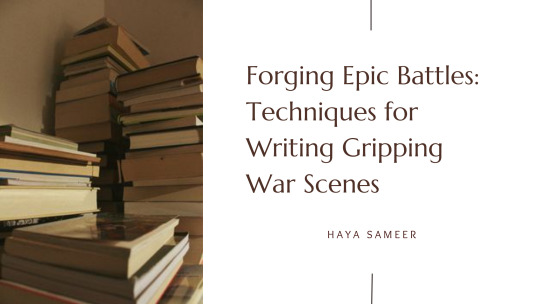
I want to start this post off with sort of an author's note: this is a long one! I tried to keep my detailing to a minimum but I guess this topic Is just so vast I couldn't help but pour it all out. This really is sort of an ultimate guide and I hope it helps! Also, it was requested by @xweirdo101x (if you want to request something just send me an ask)
War has long captivated readers' imaginations, evoking a sense of grandeur, sacrifice, and the clash of ideologies. As writers, we have the power to transport our readers to the frontlines, immersing them in the chaos, drama, and emotion of epic battles.
Crafting gripping war scenes requires a delicate balance of research, skillful storytelling, and an understanding of the human experience in times of conflict. In this guide, I will explore various techniques that will help you create dynamic and compelling war narratives, transporting your readers to the heart of the action and leaving them breathless.
Setting the Stage: Creating a Compelling War Setting
When it comes to writing gripping war scenes, creating a vivid and immersive setting is paramount. Whether you are crafting a historical war or inventing a fictional conflict, the setting serves as the backdrop against which your characters and their stories unfold. Here are essential steps to help you create a compelling war setting that captures readers' imaginations:
Research Historical Context or Build a Fictional World:
For historical wars, immerse yourself in research to understand the time period, social dynamics, and political climate surrounding the conflict. This knowledge will lend authenticity and depth to your narrative.
If you're building a fictional world, establish the rules, geography, and cultural aspects that shape the war. Consider the unique elements that set your world apart and make it feel real to readers.
Describe the Physical Environment and Atmosphere:
Depict the landscape, whether it's a war-torn city, a rugged battlefield, or a desolate wasteland. Pay attention to sensory details—sights, sounds, smells—to transport readers into the heart of the war.
Convey the atmosphere of the setting, capturing the tension, fear, or anticipation that hangs in the air. Is it shrouded in darkness and despair, or does a glimmer of hope persist? Use descriptive language to evoke the desired emotional response.
Incorporate Cultural and Societal Elements:
Explore how the war has affected the culture and society within your setting. Are there new traditions, rituals, or customs that have emerged in response to the conflict?
Consider the social dynamics at play—class divisions, power struggles, or the impact of war on marginalized groups. These elements add layers of complexity to your setting and provide opportunities for conflict and character development.
By carefully constructing your war setting, you transport readers into a world brimming with authenticity and intrigue. Whether it's the trenches of World War I, a futuristic intergalactic battle, or a mythical realm engulfed in strife, the setting sets the stage for compelling storytelling.
Building Conflict and Tension
In the realm of war fiction, conflict and tension are the driving forces that propel your narrative forward and keep readers captivated. From the clash of opposing ideologies to the internal struggles within characters, here are essential techniques for building conflict and tension in your war scenes:
Establish Clear Goals and Stakes for Characters:
Define the objectives and desires of your main characters within the war. What are they fighting for? What personal or collective goals are at stake?
Create conflicts of interest between characters, where their motivations and objectives may diverge, leading to tension-filled interactions and confrontations.
Introduce Opposing Forces and Ideologies:
Develop compelling adversaries that challenge your protagonists. These opposing forces may represent different sides of the conflict, ideologies, or even personal vendettas.
Explore the contrasting beliefs, values, and philosophies driving each side, heightening the ideological clash and intensifying the conflict.
Utilize Internal Conflicts within Characters:
Explore the internal struggles and moral dilemmas faced by your characters. How does the war affect their beliefs, principles, and sense of self?
Delve into the emotional turmoil and psychological toll of war, showcasing the internal battles characters face as they navigate the chaos and make difficult choices.
By effectively building conflict and tension, you create a dynamic and engaging narrative that keeps readers invested in your war story. The clash of goals, the ideological friction, and the internal struggles of your characters add layers of complexity and depth to your storytelling, drawing readers deeper into the heart of the conflict.
Developing Dynamic Characters
In the realm of war fiction, dynamic and well-developed characters are essential to breathe life into your narrative and create an emotional connection with readers. By crafting relatable protagonists and antagonists, you elevate the impact of your war story. Here are key considerations and techniques for developing dynamic characters within the context of war:
Crafting Relatable Protagonists:
Give your main characters depth and complexity by exploring their backgrounds, motivations, and personal histories. What drives them to participate in the war? What are their hopes, fears, and vulnerabilities?
Develop relatable goals and desires for your protagonists that resonate with readers. Show how the war impacts their lives and pushes them to grow, change, or make difficult decisions.
Creating Compelling Antagonists:
Craft antagonists who are more than just one-dimensional villains. Give them their own motivations, beliefs, and reasons for engaging in the war. This adds depth and complexity to their characters, creating a sense of empathy or understanding.
Explore the potential for redemption or transformation within your antagonists. Are they driven by misguided ideals, personal vendettas, or the pressures of their circumstances? Allow their development to challenge readers' perspectives.
Conveying the Psychological Impact of War:
Explore the emotional and psychological toll that war takes on your characters. Depict their fears, traumas, and inner conflicts as they grapple with the horrors and realities of the battlefield.
Show the evolution of their beliefs and perspectives as they confront the brutalities of war. Allow their experiences to shape their character arcs, highlighting the resilience, resilience, and vulnerabilities that emerge in the face of adversity.
By developing dynamic characters in your war narrative, you create a multi-dimensional and emotionally resonant story. Readers will become invested in their journeys, experiencing the triumphs, losses, and personal transformations that unfold throughout the war.
Writing Action-Packed Battle Scenes
Action-packed battle scenes are the heart of war fiction, where the intensity and stakes are at their highest. These scenes immerse readers in the chaos, danger, and adrenaline of the conflict. To craft gripping battle scenes, consider the following techniques:
Structuring Battle Sequences for Maximum Impact:
Begin with a clear sense of purpose for the battle scene. What are the objectives? What is at stake? Establish the goals and set the stage for the conflict.
Build tension gradually, starting with smaller skirmishes or encounters that escalate toward the climactic moments. Consider pacing, alternating moments of heightened action with moments of respite for emotional impact.
Balancing Fast-Paced Action and Descriptive Details:
Use concise and vivid language to convey the fast-paced nature of battle. Focus on capturing the essence of the action, highlighting key movements, and sensory details that immerse readers in the experience.
Strike a balance between brevity and providing enough detail to engage the reader's imagination. Avoid overwhelming readers with excessive description, ensuring that every word serves a purpose and contributes to the overall impact.
Using Sensory Language to Immerse Readers:
Engage multiple senses to transport readers into the battle scene. Describe the sights, sounds, smells, and tactile sensations to evoke a visceral experience.
Leverage sensory details to enhance the emotional impact of the battle, capturing the fear, adrenaline, and urgency felt by characters and evoking a similar response in readers.
Good action-packed battle scenes bring the war to life on the page, immersing readers in the heart-pounding action. Remember to focus not only on the physical aspects of combat but also on the emotional and psychological experiences of your characters.
Conveying Emotional Resonance
In war fiction, it is crucial to convey the emotional impact of the conflict on both individual characters and the larger society. By tapping into the raw emotions experienced during times of war, you can create a profound connection with your readers. Here are key techniques for conveying emotional resonance in your war narrative:
Show the Human Cost of War:
Portray the personal sacrifices, losses, and tragedies that characters endure in the face of war. Highlight the emotional toll on their relationships, families, and communities.
Explore the range of emotions experienced by characters, such as fear, grief, anger, and resilience. Through their struggles, allow readers to empathize with the profound impact of war on the human psyche.
Engage the Senses to Evoke Emotion:
Utilize sensory language to evoke emotions within readers. Describe the sights, sounds, smells, and tactile sensations associated with war to create a vivid and immersive experience.
Connect specific sensory details to the emotions they evoke. For example, the acrid stench of smoke may elicit a sense of danger or the distant cries of anguish may stir feelings of sorrow.
Develop Authentic and Complex Relationships:
Showcase the bonds formed and tested amidst the chaos of war. Explore friendships, romances, and the camaraderie among soldiers to highlight the connections that sustain characters in the face of adversity.
Depict the conflicts and tensions that arise within relationships due to the strain of war. This adds layers of emotional complexity and authenticity to your narrative.
By effectively conveying emotional resonance, you invite readers to experience the human side of war. They will connect with the characters on a deeper level and become emotionally invested in their journeys.
Navigating Moral and Ethical Dilemmas
War is often accompanied by moral and ethical dilemmas that test the values and principles of individuals and societies. As a war fiction writer, it is important to explore these complexities and shed light on the difficult choices characters face. Here are key considerations for navigating moral and ethical dilemmas in your war narrative:
Present Conflicting Perspectives:
Introduce characters with differing moral viewpoints and beliefs. Show the diversity of perspectives within the war, whether it's among the protagonists, antagonists, or the larger society.
Challenge readers to contemplate the gray areas of morality and the complexities of right and wrong by presenting conflicting viewpoints and the reasons behind them.
Highlight the Consequences of Choices:
Illustrate the consequences of characters' actions and decisions. Showcase how their choices ripple through the narrative, affecting themselves and those around them.
Explore the moral dilemmas characters face, such as choosing between duty and personal convictions, sacrificing the few for the many, or grappling with the aftermath of their actions.
Offer Reflection and Discussion:
Provide opportunities for characters to reflect on their choices, engaging in internal dialogue or discussions with others. This allows readers to contemplate the moral implications alongside the characters.
Invite readers to reflect on their own moral compass and engage in discussions surrounding the ethical dimensions raised in your war narrative.
Navigating moral and ethical dilemmas makes your war fiction go beyond the surface-level action and delve into the deeper questions of humanity. It prompts readers to question their own values, moral boundaries, and the intricate web of choices that arise in times of conflict.
Research and Authenticity in War Fiction
For war fiction to have a lasting impact, it is crucial to conduct thorough research and strive for authenticity in your narrative. By grounding your story in accurate details and historical context, you enhance its credibility and immerse readers in the world of war. Here are key considerations for incorporating research and authenticity in your war fiction:
Study Historical Events and Settings:
Research the historical events, conflicts, and time periods that serve as the backdrop for your war narrative. Gain a comprehensive understanding of the context, including the political, social, and cultural factors that influenced the war.
Dive into the specifics of battle strategies, weaponry, and tactics employed during the time period. This knowledge will help you create authentic and realistic war scenes.
Explore Personal Accounts and Memoirs:
Read personal accounts, memoirs, and interviews of individuals who have experienced war firsthand. These sources provide invaluable insights into the emotions, challenges, and nuances of the human experience during wartime.
Pay attention to the details of daily life, the physical and psychological tolls, and the individual stories of courage, sacrifice, and resilience. Incorporate these elements into your narrative to add depth and authenticity.
Consult Experts and Military Advisers:
Seek guidance from military advisers, historians, or experts in the field to ensure accuracy in depicting military operations, protocols, and terminology.
Engage in conversations or interviews with individuals who have expertise in areas relevant to your story, such as veterans, soldiers, or scholars. Their perspectives can offer valuable insights and help you portray the realities of war with authenticity.
Strive for Emotional Truth:
While research and accuracy are crucial, remember that emotional truth is equally important. Balance historical accuracy with the emotional resonance of your characters and their experiences.
Capture the human aspects of war, such as the impact on relationships, the psychological trauma, and the bonds forged in the face of adversity. Connect readers to the emotional core of your story.
By incorporating thorough research and striving for authenticity, you create a rich and immersive war narrative that resonates with readers. The combination of accurate historical details, personal accounts, and emotional depth brings your story to life.
War fiction is a genre that holds immense power to captivate readers, evoke emotions, and shed light on the complexities of human nature during times of conflict. Through the techniques and considerations I have explored in this guide, you have the tools to craft compelling war narratives that resonate with authenticity and engage your readers on a profound level.
I hope this blog on forging epic battles will help you in your writing journey. Be sure to comment any tips of your own to help your fellow authors prosper, and follow my blog for new blog updates every Monday and Thursday.
Looking For More Writing Tips And Tricks?
Are you an author looking for writing tips and tricks to better your manuscript? Or do you want to learn about how to get a literary agent, get published and properly market your book? Consider checking out the rest of Haya’s book blog where I post writing and marketing tools for authors every Monday and Thursday
#hayatheauthor#haya's book blog#haya blogs#writing prompt#writing tools#writing stuff#creative writing#writing tips#writing blog#writer community#writing advice#writer tips#writing community#writer things#writing life#writing things#writing tip#writing techniques#writing topics#writing tool#writing tumblr#writing resources#writing inspiration#writing inspo#writing reference#writer#writersofinstagram#writers on tumblr#writers block
582 notes
·
View notes
Text
I went to the Apple Store yesterday to try the scripted demo of their VR headset. My overall impression is that it's the best possible execution of what might be a fundamentally flawed idea.
The passthrough video is pretty incredible. It's somewhat dimmer than reality, and the color accuracy is just OK, but it's more than good enough to feel like you're looking through clear displays at the real world. I'm told the passthrough on the Quest 3 is even better, but haven't tried that and can't comment. One thing is that there is a weird motion blur effect when you turn your head, I'm not sure if that's a display tech limitation or introduced deliberately by the software as a workaround for a different display tech limitation.
The resolution is 4K per eye, which, as mentioned, is more than enough for a powerful sense of presence in the real world. One of the nifty bits of the demo was when you turn the dial to tune out the world and suddenly you're sitting by a mountain lake, and the feeling of actually being there is overwhelming. The dystopian implications of needing a VR headset to sit at a mountain lake aside, it would be cool to have one just to have your office be anywhere you can imagine. Not $3500-before-tax cool, but cool.
Wow sports leagues are going to love this thing. I don't give a shit about sports and even I was thinking, "If the NBA put a stereoscopic camera courtside and sold you games for $50 a pop, I'd absolutely buy that"
But 4K per eye is not enough to do work, not even close. The experience of using normal computer-y applications on this was not unlike plugging your laptop in to a TV that's at the normal TV distance. You can do it, it works, but it's not anyone's preferred way of working. Text is amazingly legible, but only at sizes that are equivalent to having a single webpage take up your entire 4K monitor at normal monitor distance.
It is not particularly comfortable. Part of this might be that the store demo makes you use the "catcher's mitt" strap, which only goes around the back of your head and so gravity has to be countered only by the pressure of the thing against your face. Reviewers have said that if you use the other band that goes over your head the situation is better, but still.
A lot of early comments were making fun of Apple for having the battery be an external thing you put in your pocket and attach with a wire, but I think that's just fine: we all walk around with giant batteries in our pockets anyway, and anything you can do to have less weight on your head is a Good Thing. But then Apple took all those weight savings and spent them on making the stupid thing out of metal and glass instead of polycarbonate. It's nuts! It's like if you made a car that was 500kg lighter because you invented magical tech for keeping the engine somewhere else, and then went "great! with all the weight savings now we can build the body out of lead". Apple, you don't need to fear plastic. Plastic is good! Plastic built modern civilization.
You control it with a combination of eye tracking and pinch gestures. This is the main piece of evidence of my "best version of a bad idea" thesis: it works really, really well; so well that I can tell this is probably an evolutionary dead end. It's just fine— miraculous, even— for dragging windows around and doing the basic stuff the in-store demo has you do. It's amazing that you can more or less have your hands anywhere, including on your lap, and the recognition works perfectly (by contrast with the HoloLens I tried 5 or so years ago where the gesture recognition was total crap). But it's immediately obvious that you can never do serious manipulation of your computing environment with this.
The takeaway is that it's incredible for passive consumption of specifically-made media, assuming that ever exists at scale. But it will be a long time before we're gogged in like Hiro Protagonist to do our office jobs this way.
167 notes
·
View notes
Text
Now that I’m older, it’s occurred to me that Jack Sparrow really does play the role of the mentor figure in Curse of the Black Pearl. He’s definitely a very cleverly subversive take on the trope, but he is a take on it nonetheless; The older figure who teaches our young, hotshot hero how to act and passes on wisdom. “I knew your father.” An experienced member of a forbidden group that our protagonist learns to accept he is a part of. Acts as a call to action, and isn’t introduced until past the first few scenes of the film.
By contrast, Elizabeth and Will are established in the movie’s first scene, which further strengthens the actually hot take that they’re the main protagonists of the film and the trilogy as a whole, not Jack. Jack is just less recognizable as a mentor because he breaks a lot of the rules (more guidelines really) of the trope, and is treated as more than just a tool for our main character’s growth; He’s someone with his own life and wants and stake in this, too.
Jack Sparrow is ultimately the Gandalf, the Obi-Wan of Pirates of the Caribbean. And that leads me to my argument that PotC is the Star Wars of its generation, with its own Empire Strikes Back and everything. It’s got a lot of the same tropes and structure, but it’s mixed around and dressed up in such a unique way that most people fail to realize this at first glance.
Take for example, the dynamic of Davy Jones and Cutler Beckett... This is just Vader and Tarkin in A New Hope; A more iconic, supernatural threat, physically imposing, who is nevertheless subservient to Just Some Guy who is British and represents the Machine that strips the world of its magic and wonder. Vader and Jones are more romantic, they’ve got sad backstories and are humanized to the audience; But Tarkin and Beckett are banal and simple, just ruthless men who don’t care, like in real life.
But while Tarkin dies in the first film to make way for Vader taking the spotlight, as well as his similarly theatrical Emperor, the creators of PotC clearly wanted to explore the dynamic of a supernatural force straining against his imperial collar, and the tension of knowing he is contributing to the decline of his own kind. They took Vader and Tarkin’s relationship and made it front and center, happening at the end of the trilogy and not at its beginning. And it is Beckett and the imperial machine that is emphasized as the true evil, whereas in Star Wars, the Empire takes orders from Palpatine and his Dark Side shenanigans, who are framed as the foundation for the conflict.
The crew reinvented Star Wars for a new audience, rather than just... pulling off of the brand and imagery of Star Wars, or copying it word-for-word. They understood the core foundation of the story and the earnest creativity that comes into making something both familiar yet inarguably new, which subverts the stories that came before it in a meaningful manner.
#pirates of the caribbean#potc#jack sparrow#davy jones#cutler beckett#curse of the black pearl#cotbp#star wars#meta#analysis
434 notes
·
View notes